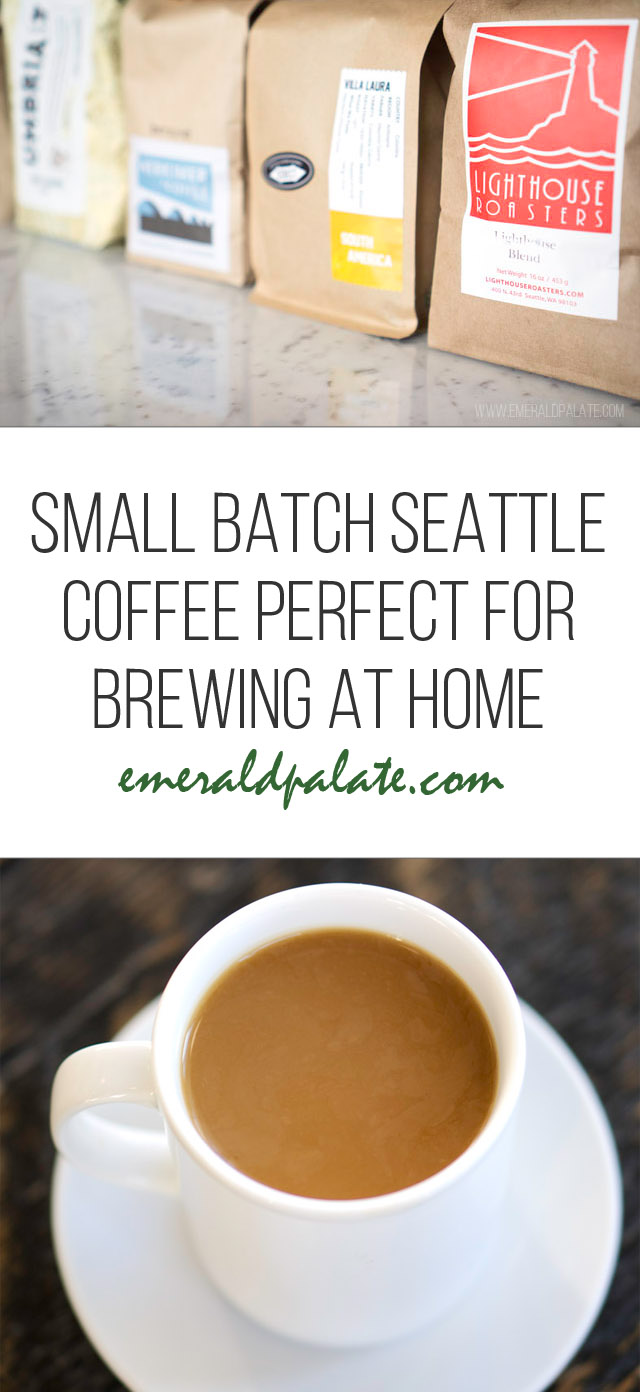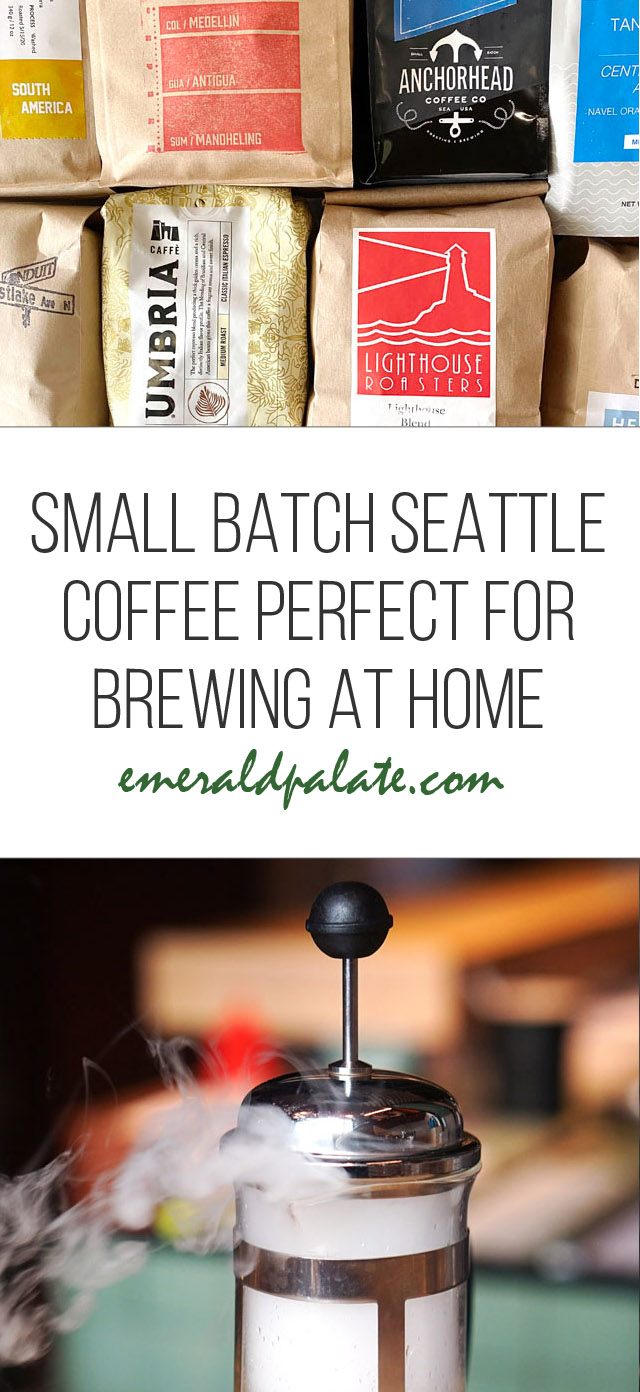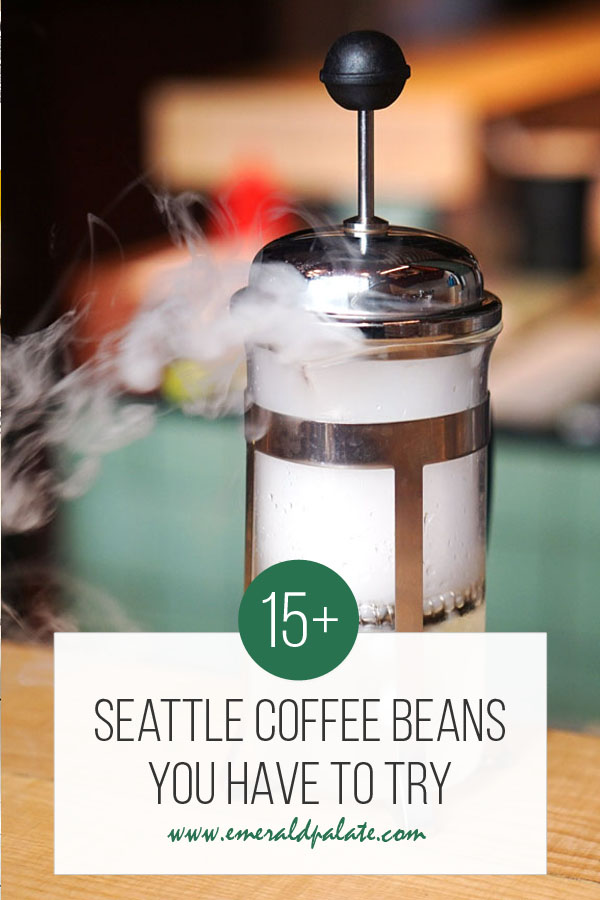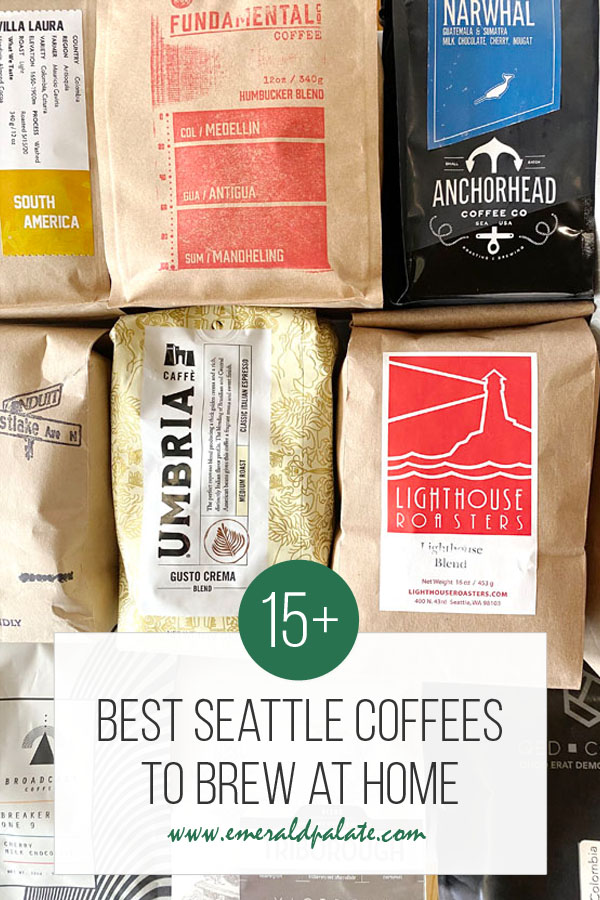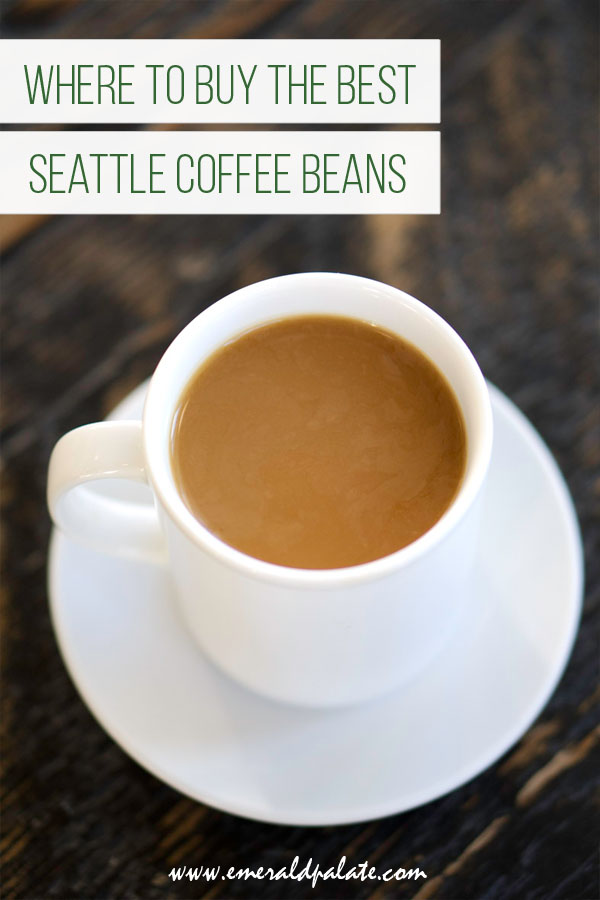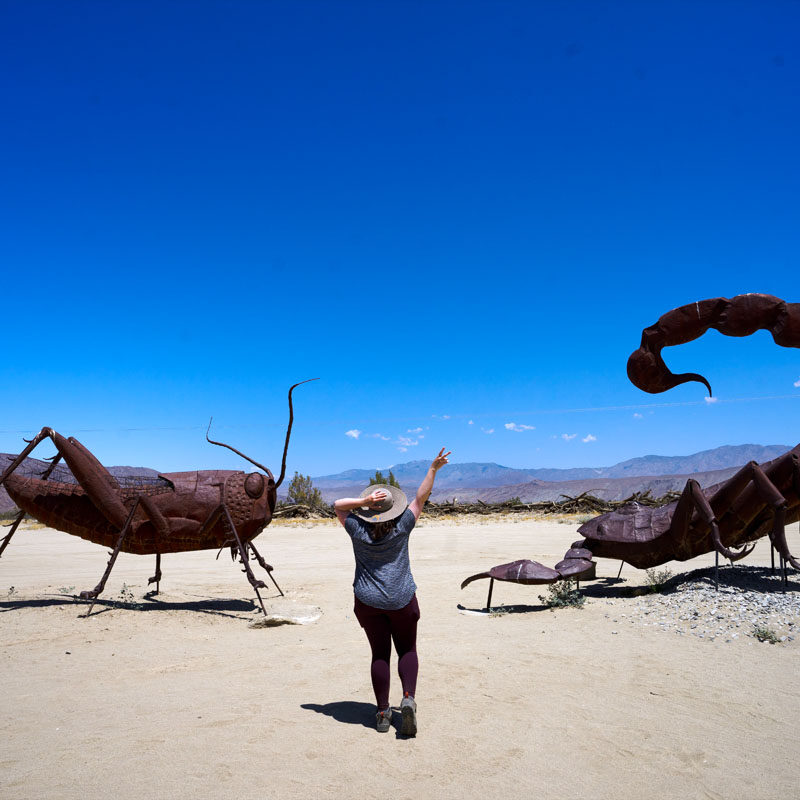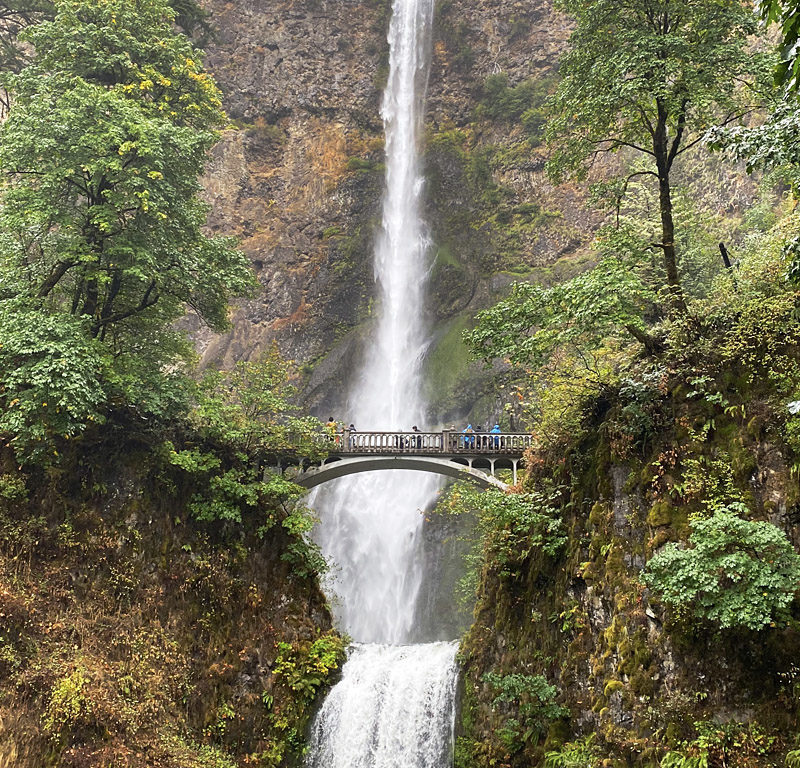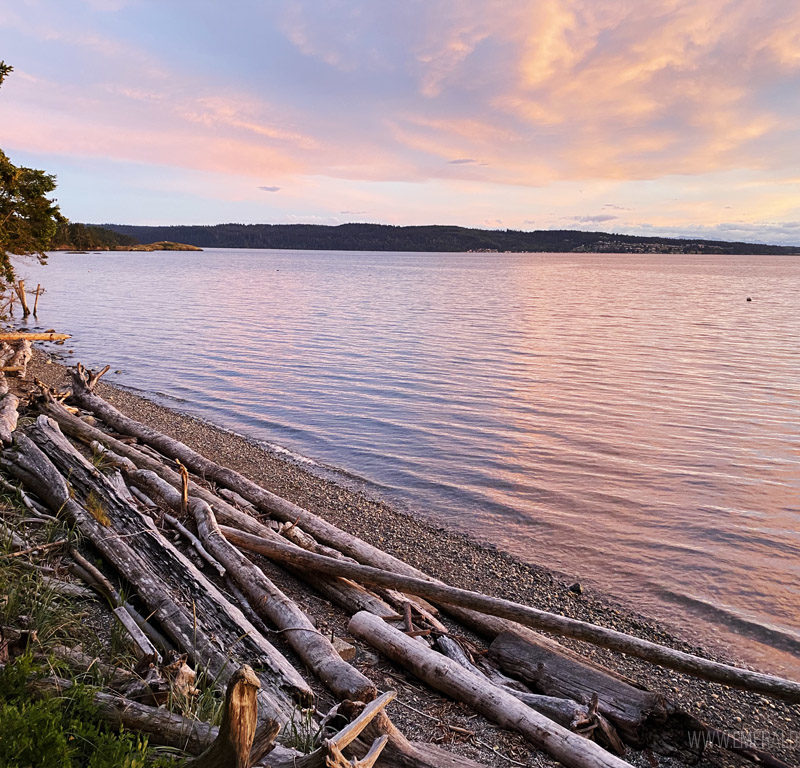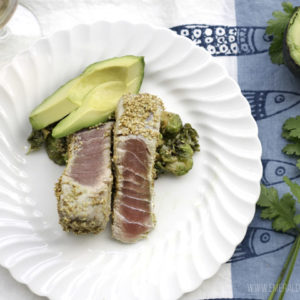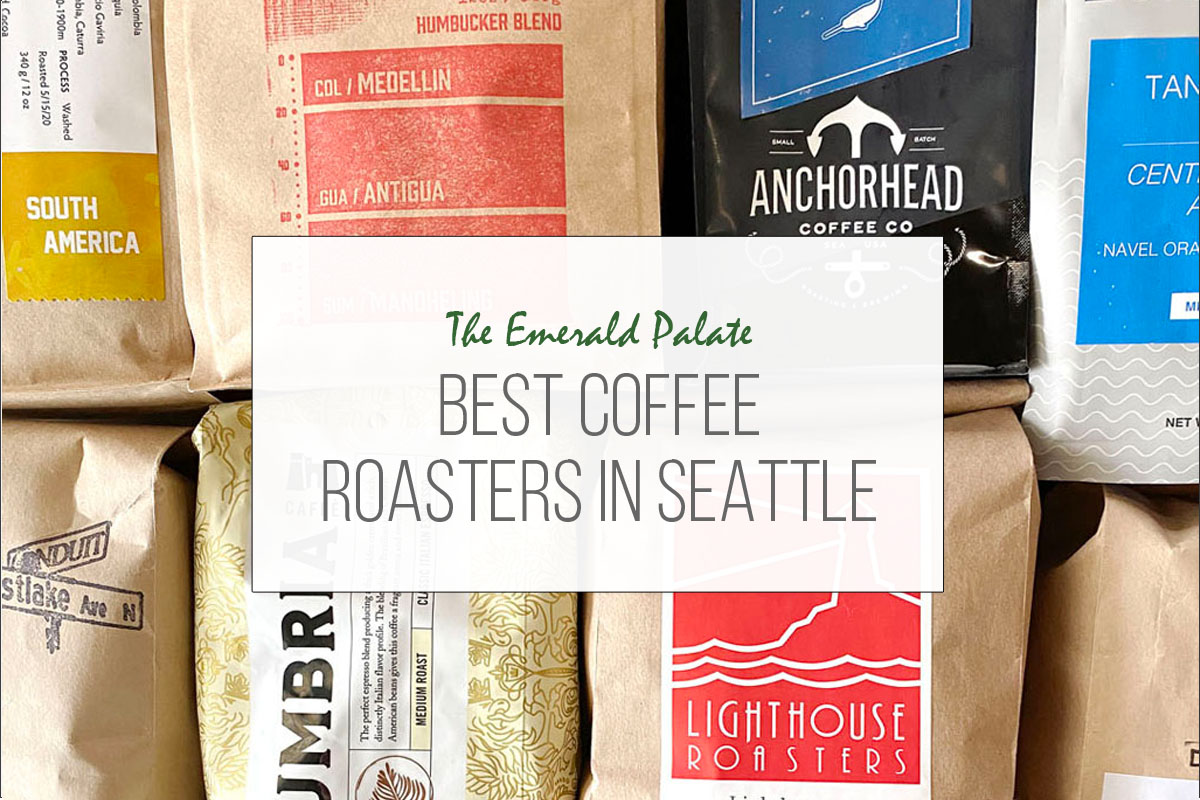
I’m lucky to live in the city known for coffee, but you don’t have to live here to enjoy the best coffee beans in Seattle. You can get beans from small batch coffee roasters delivered right to your door from most of the Seattle coffee shops on this list.
There are about 80 coffee growing countries in the world spanning four continents, each producing unique flavors based on the elevation, climate, and terroir. These Seattle coffee roasters ethically source high-quality beans, oftentimes directly from the farmer, and honor their origins by coaxing out flavors through meticulous roasting processes.
If you’re a serious coffee lover, grab some of these best coffee beans from Seattle and brew them from the comfort of your own home!
This post has affiliate links, which means I’ll earn a small commission at no cost to you if you click on them and make a purchase. This is a small way I earn money to support this site. If links aren’t showing up for you, turn off your ad blocking software. Thank you for your support!
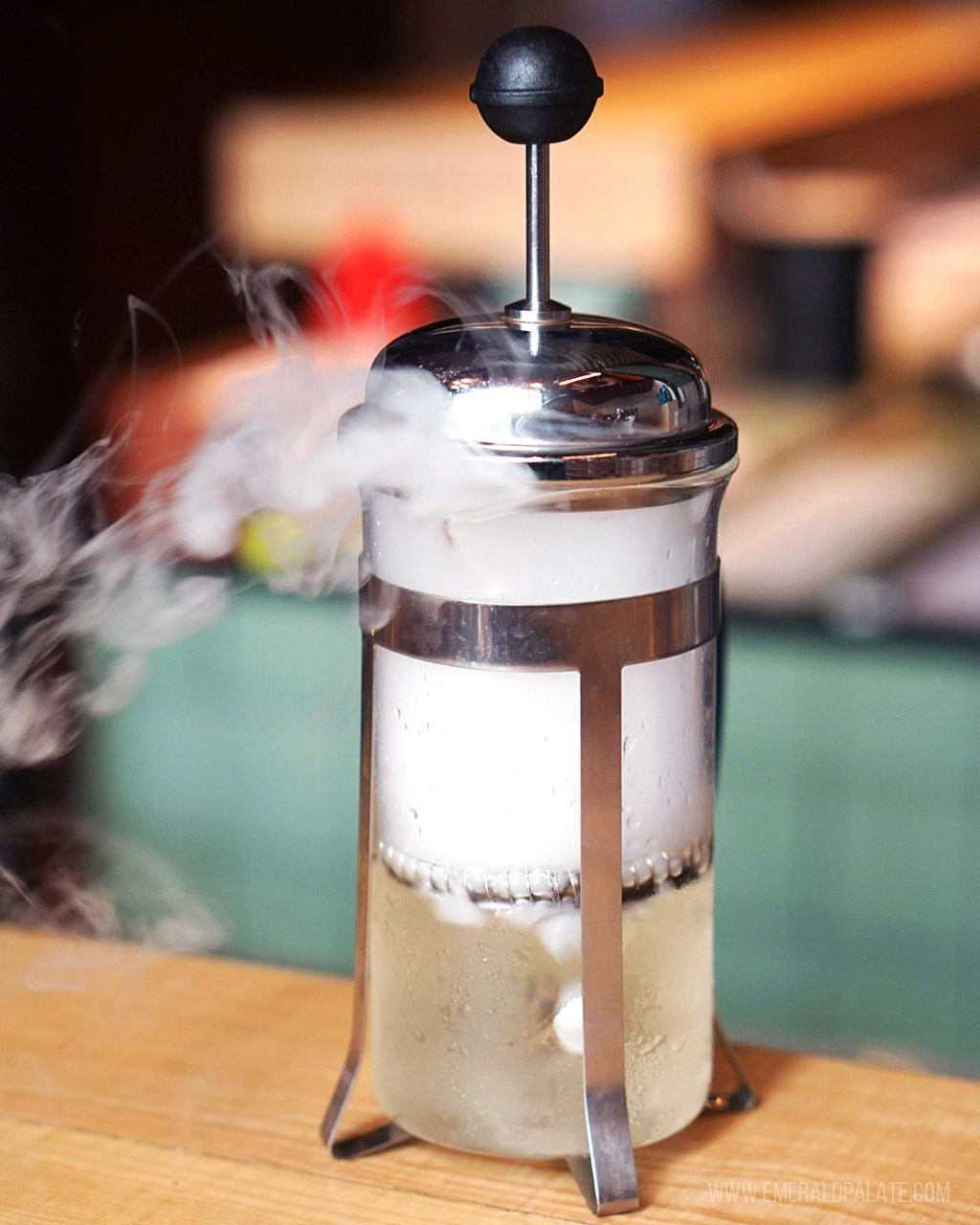
Best Coffee Beans in Seattle, WA
I highly encourage you to buy these coffee beans directly from the small batch Seattle coffee roasters. However, you’ll also find a lot of these beans at local Seattle grocery stores like Town & Country, PCC, and Whole Foods.
You can also visit some of these small batch coffee roasters’ Seattle coffee shops to sample their coffee and grab a bag. While all of them got their start in Seattle, there are a few that have been fortunate enough to expand and open cafes in cities around the US.
Alright, now the list you’ve been waiting for: My favorite Seattle coffee beans from small batch roasters. I put them in loose order, starting with my favorites that I buy again and again. As I try more Seattle coffee, I’ll update this list. So, pin this coffee guide for later!
Onda Origins
website | 5600 Rainier Ave S (Hillman City) | monthly subscription available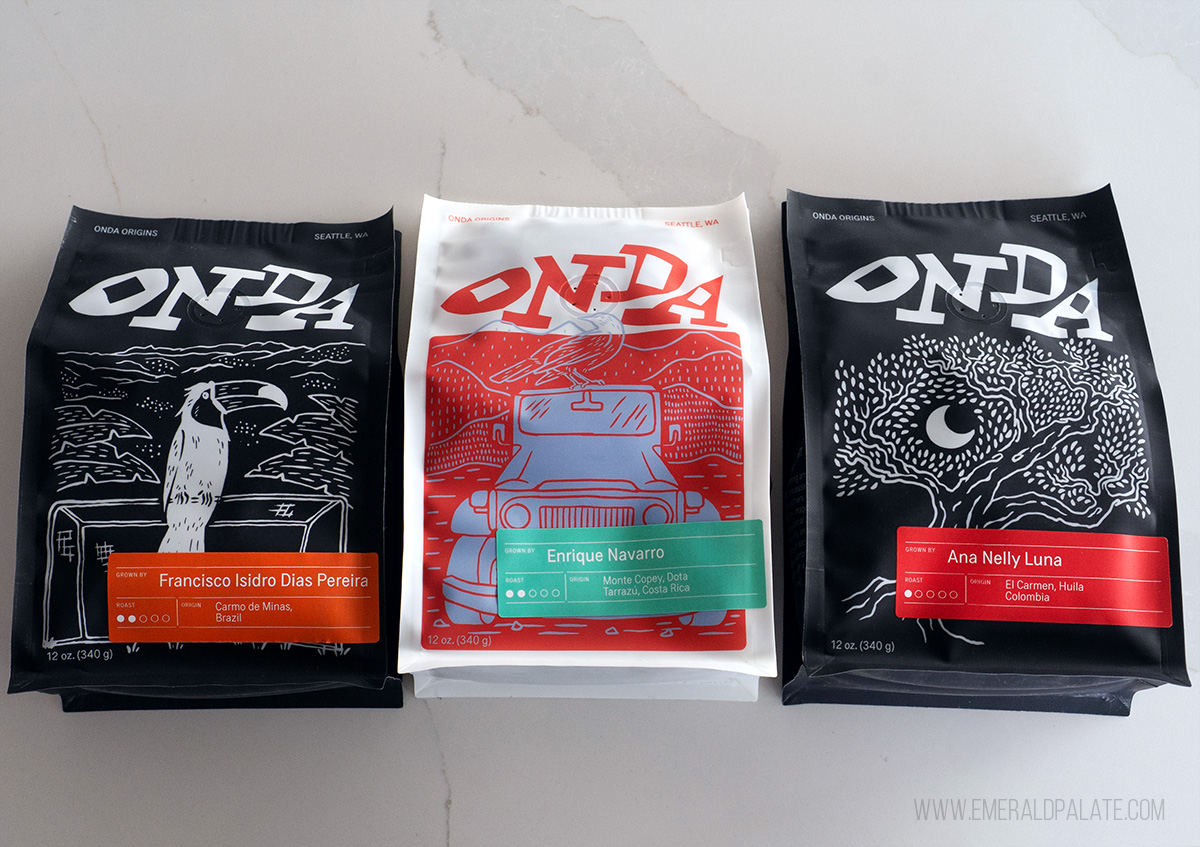
Onda Origins is one of my favorite Seattle coffee roasters. They have such an intimate relationship with their growers, even going as far as texting them on WhatsApp and going on vacations with their families. They also share earnings from each bag sold directly with the farmer who grew the beans, and you know this because they tell you how much went to the farmer on your receipt.
Not many people know just how closely they work with their farmers. They buy the green coffee (green=unroasted) upfront during harvest at a price that’s higher than Fair Trade. Then, they roast it in 10 lb. batches at their roastery behind the Hillman City Cafe. Once it’s roasted, they continue to pay the farmers incrementally with each sale, which helps guarantee a steady, consistent income.
They recently did some rebranding and have been incorporating gorgeous artwork into their packaging that’s specific to their growing regions. Every art piece is based on the suggestions of their growers, further emphasizing how important the bean-to-coffee relationship is.
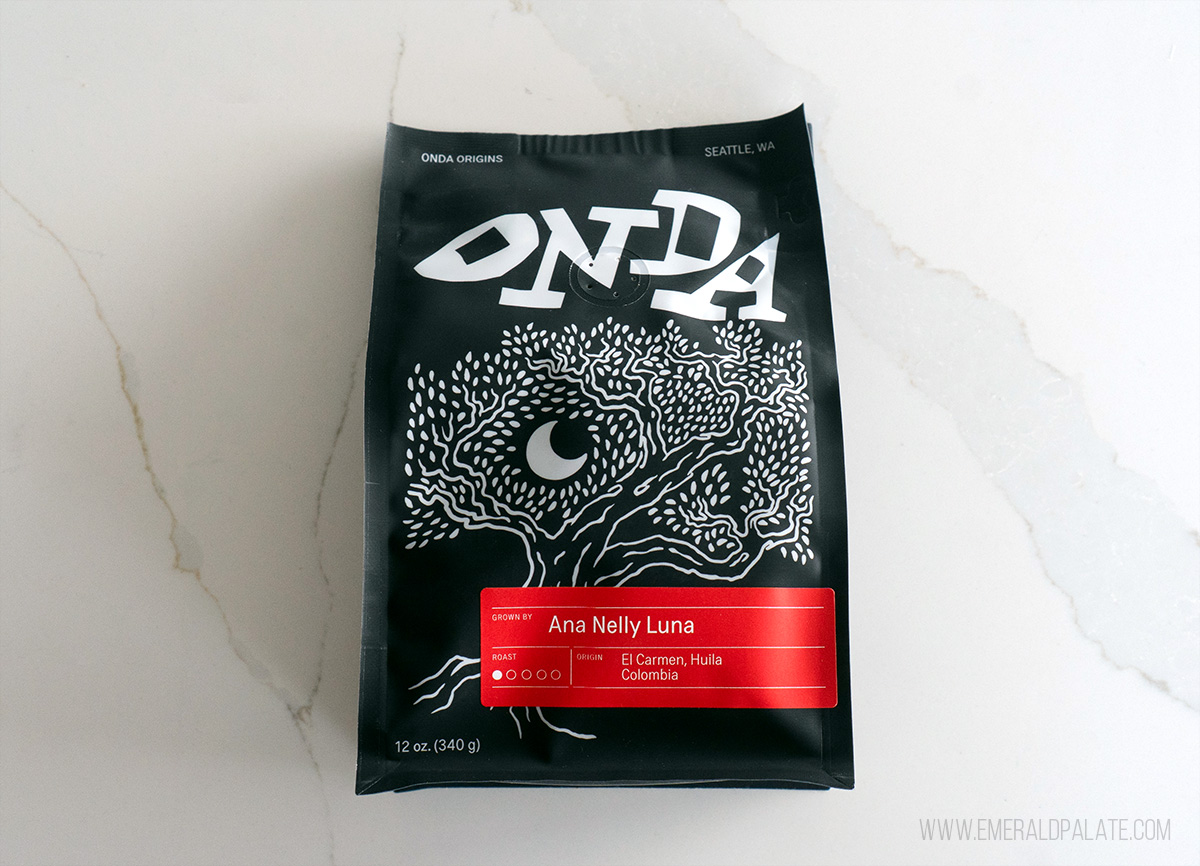
My favorite beans come from Ana Nelly Luna out of Colombia (~$24). Her beans are light roasted and have intense cocoa and vanilla vibes. The flavors are somehow cozy and bright at the same time giving off strawberry cheesecake notes.
You can order directly from Onda Origins online or pick it up at its Hillman City location, one of the best Seattle coffee shops. It’s also sold at Metropolitan Markets and Whole Foods around Seattle.
Boon Boona Coffee
website | 724 S 3rd St (Renton), 1223 E Cherry St (Central District) & 4326 University Ave NE (U-District) | monthly subscription available
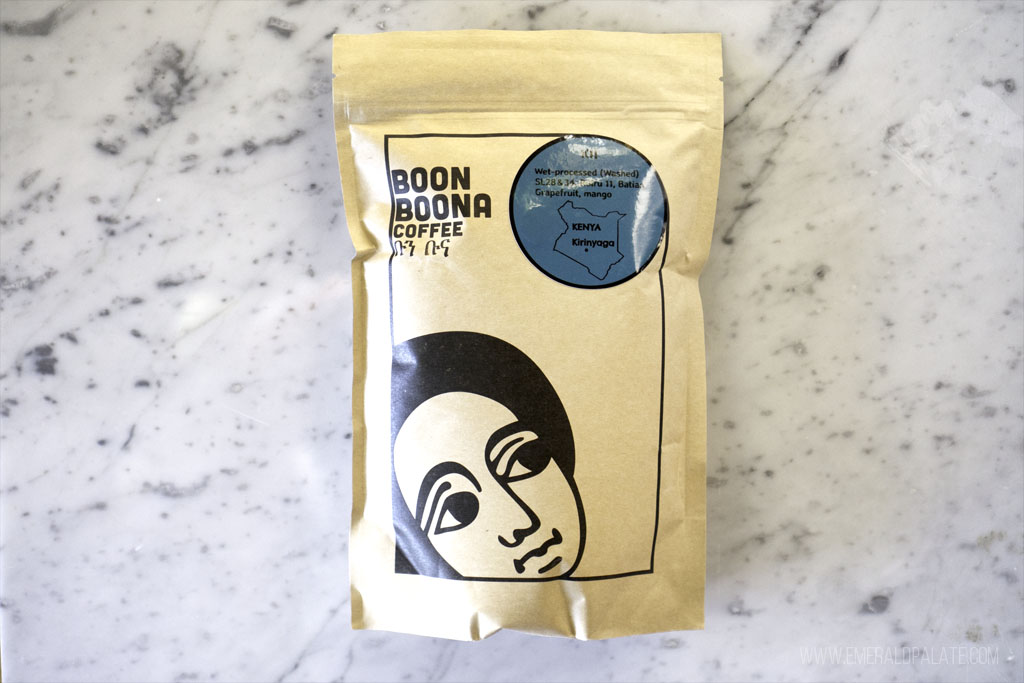
This Black-owned Seattle coffee shop sources beans directly from Africa. You can buy unroasted beans if you want to recreate the East African traditional ceremony of taking green coffee beans, pan roasting it, and brewing it in the clay pot known as a Jebena.
I always gravitate toward the roasted Kii Kenya bag (~$21) when available for its flavor and texture. It’s creamy and smooth with flavors of hazelnut, caramel, and chocolate. It isn’t bitter at all but rather leaves a long, sweet finish perfect for perking up your morning ritual.
Pro tip: Want more Black-owned coffee? Local company NoirePack curates sampler boxes of Black-owned roasters, many of which are from the PNW.
Kuma Coffee
website | online & retail only | monthly subscriptions available
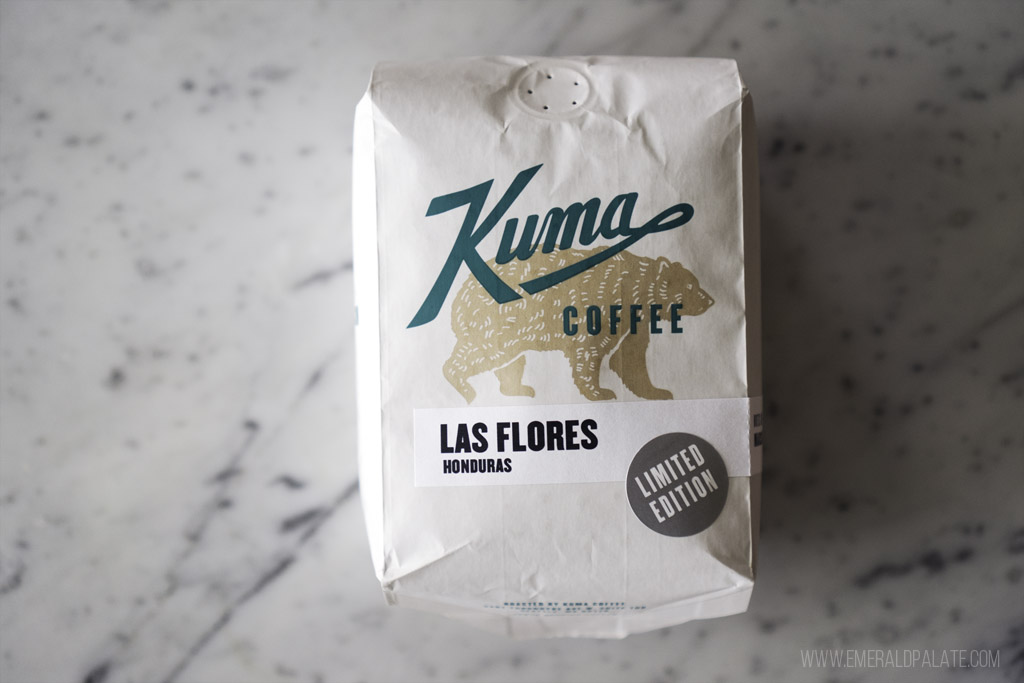
Kuma means “bear” in Japanese. Owner Peter Mark started tinkering with coffee roasting in his Seattle garage after moving back to the States from Japan. He named his operation after his shaggy dog that he named “Kuma” because of his bear-like appearance.
Despite shipping nationwide via online orders, they’re still a nimble team roasting in Seattle’s Interbay neighborhood. They’re making some really awesome coffee beans, such as the seasonal Bear Claus holiday blend (~$19) that finishes with a tea-like lightness and fruity zing, or the limited-edition Las Flores, Honduras (~$18) that tastes like chocolate hazelnut and coffee.
Anchorhead Coffee
website | multiple locations in Seattle, Bellevue, and Issaquah | monthly subscription available
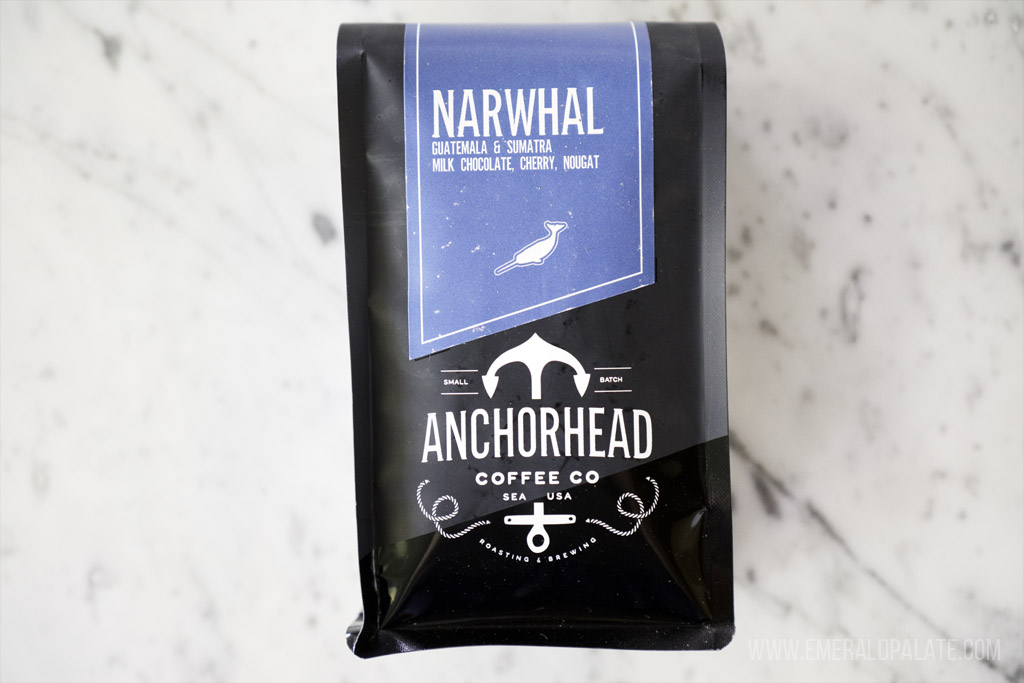
Anchorhead was started by two ex-audio engineers selling cold-brewed coffee at farmers markets around Seattle. They focus on beans best brewed by the pour-over method, but I use a French press, and their beans are still phenomenal.
My favorite bags are the Narwhal blend (~$19) and the Costa Rica El Cedral Natural (~$21). The Narwhal blend is silky smooth, with slightly acidic fruity notes at the end. It tastes exceptional both black and with some cream. The Cedral Natural starts with a subtle marshmallow-like sweetness at first but then mellows out with a fruity cherry zing that lingers on the palate.
Zoka Coffee Roasters
website | multiple locations in Green Lake, South Lake Union, University District, and Kirkland | monthly subscriptions available
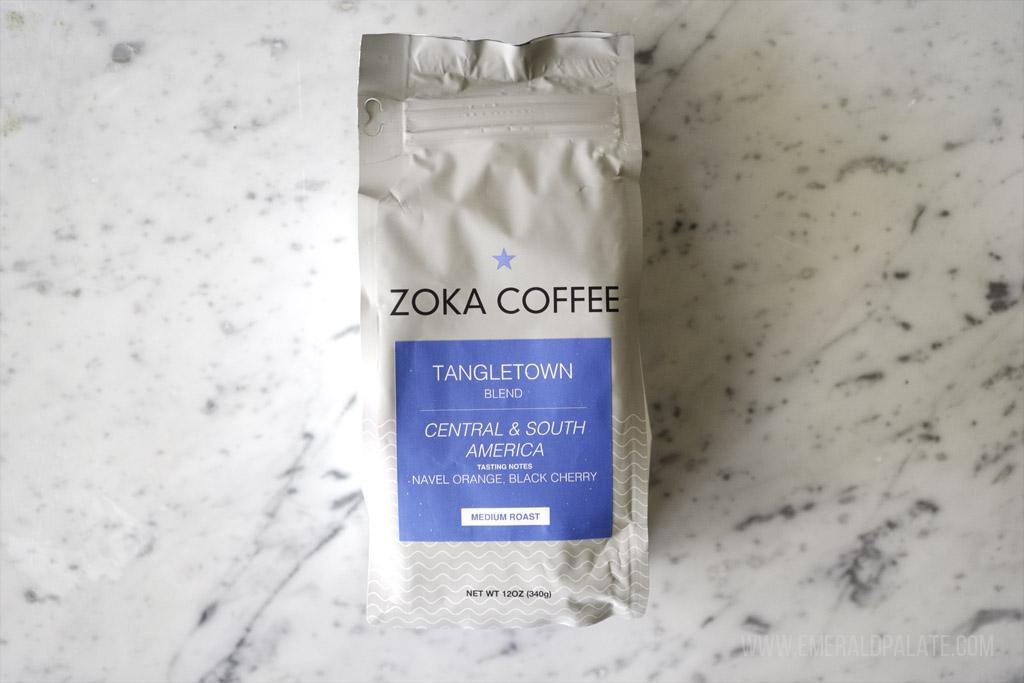
Zoka will always hold a quirky place in my memory. When I first moved to Seattle, I joined a foodie meet-up group to try and make friends (are meet-ups still a thing?!). One of our first meet-ups was at Zoka in Green Lake, where I remember having this intense conversation about who-knows-what with this dude named Zoltan.
Anyway, memories aside, Zoka Coffee makes some damn good coffee. My favorite coffee bean bag to take home is Tangletown (~$18). It’s highly acidic and makes you pucker a bit compared to others, but I wouldn’t call it sour. Instead, it finishes smooth. This coffee is especially good without milk if you like to take your coffee black.
Fulcrum Coffee
website | 590 Bell St (Belltown) | monthly subscriptions available
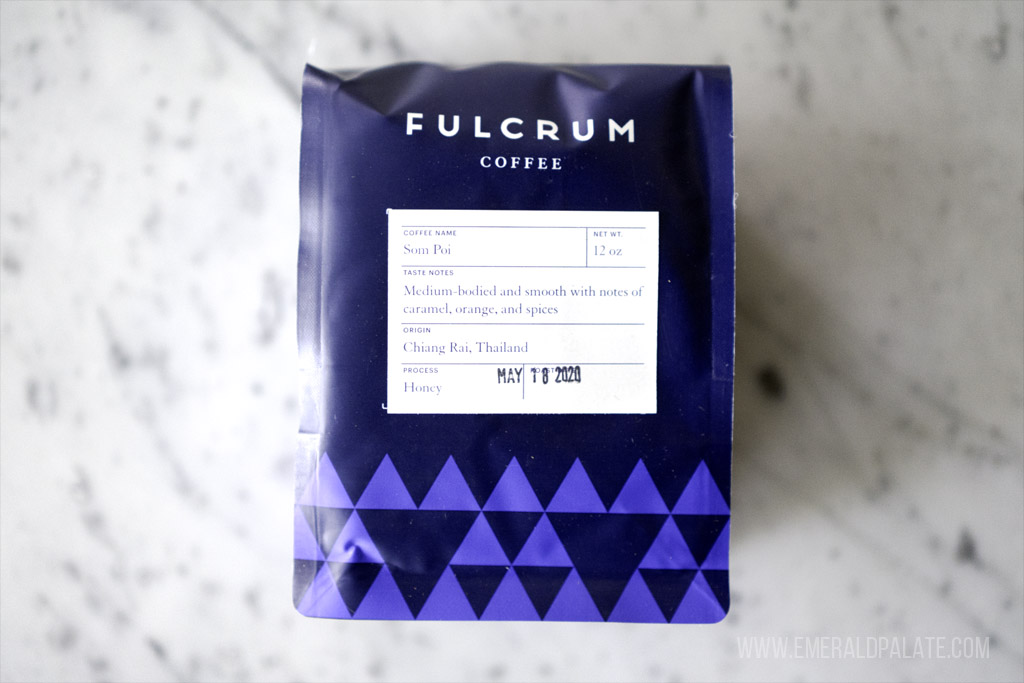
Fulcrum is a Seattle coffee company that formed when Silver Cup and Urban City roasters joined forces. Its roasting program is led by a fifth-generation coffee farmer and the business focuses on helping micro-entrepreneurs get started opening coffee shops serving Fulcrum’s line of coffees.
For example, one coffee shop they support and that sells their Silver City coffee line is The Station in Beacon Hill. Owners Luis and Leona opened their tiny independent coffee shop as a place welcoming and representative of BIPOC and LGBQTIA+. They make an effort to ensure their employees represent as many of these identities as possible and also sought out permission from the Duwamish Tribe before opening.
One of my favorite Fulcrum coffee bags is the single-origin coffee, Thailand Som Poi (~$17). It’s super smooth and sweet, leaving an aftertaste of molasses and caramel on your palate. There’s absolutely no smokiness or bitterness, so this Seattle coffee is perfect for those who hate dark roasts.
Giddy Sloth
website | 12510 15th Ave NE E (Pinehurst)
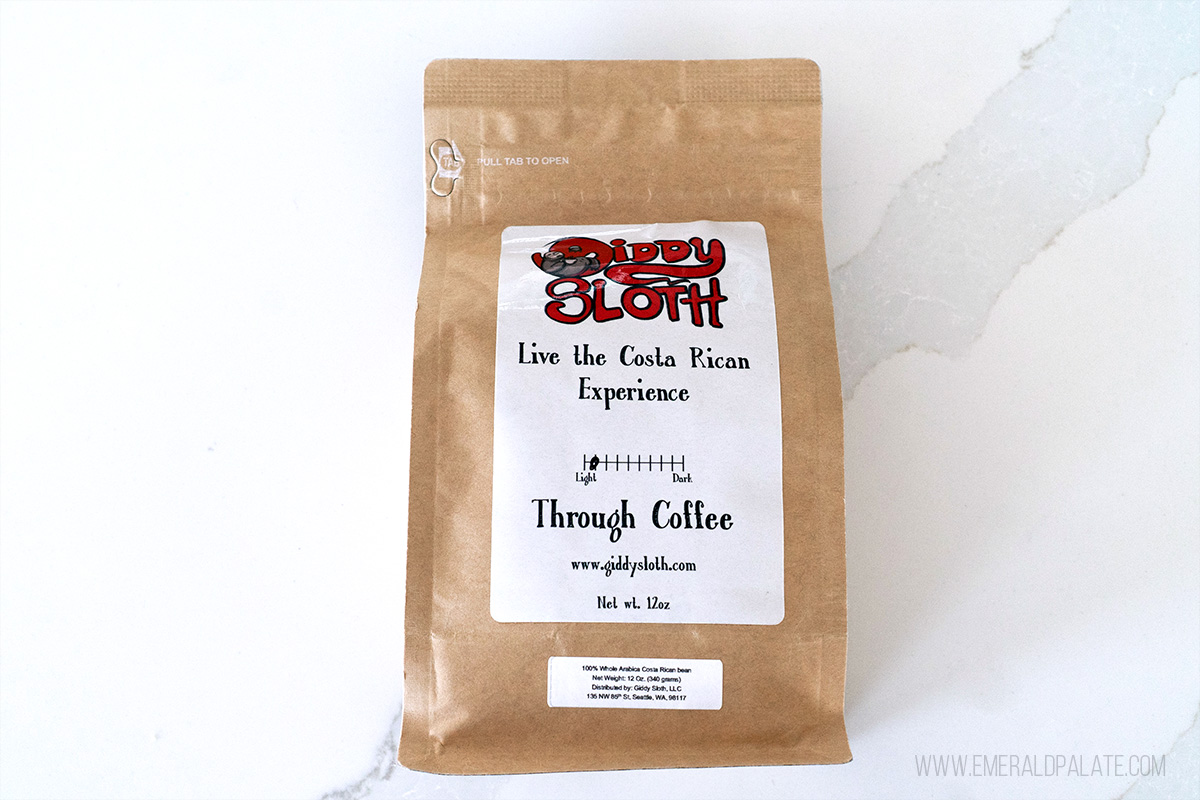
Giddy Sloth is a Latin-owned micro roaster created by Carlos Chaves, who grew up in Plaza Viquez, a bustling neighborhood in San Jose. He grew up drinking coffee with his grandmother and learned as early as the age of 4 the ceremonial act of brewing the perfect cup of Costa Rican coffee.
He moved to the states when he was 14 and brought with him his love for good coffee. Giddy Sloth opened in 2022 as a way for Carlos to share his Costa Rican experience through the lens of hyper-sourced coffee.
If it’s available, get the Tarrazu (~$20). It’s a light roast and super mellow, with a soft marshmallow mouthfeel and subtle citrus notes. Essentially, it’s an everyday sipper that both aficionados and coffee noobs alike will enjoy.
QED Coffee
website | 1418 31st Ave S (Mt.Baker) and 6080 35th Ave SW (West Seattle)
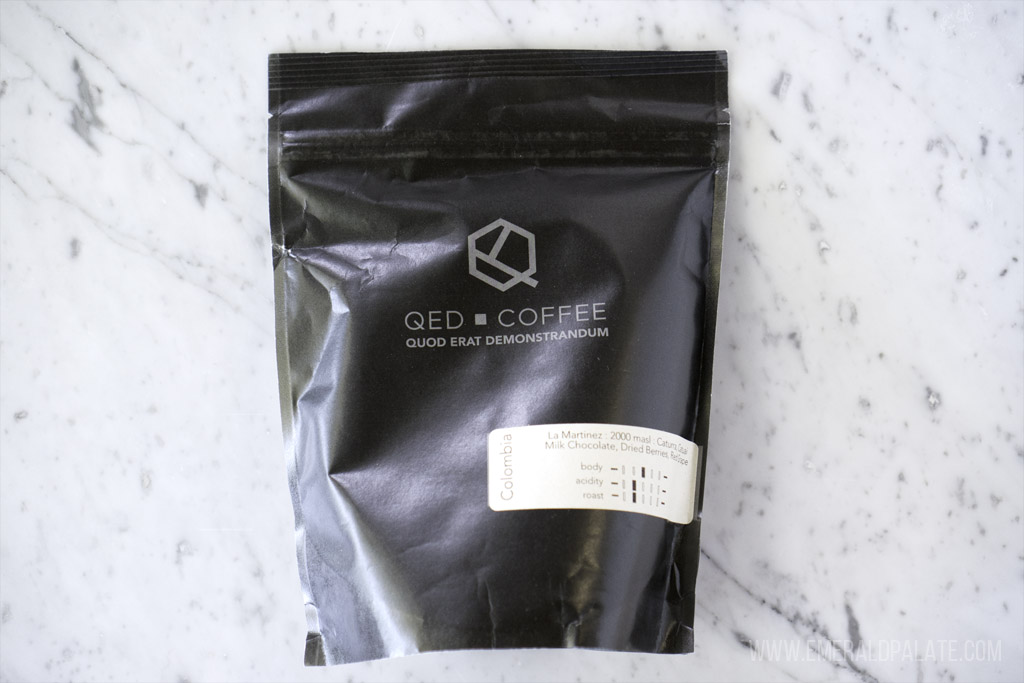
QED is a micro roaster that focuses on the craft and geekery around coffee roasting. The name’s origin says it all.
According to its website, “QED is a statement of completion used at the end of mathematical proofs. It signifies the conclusion of a specific intention – essentially saying, ‘I have achieved what I set out to do and I am ready to share it with the world.’ That is exactly what QEDcoffee is about. Through the art of roasting, we strive to showcase the best flavors a coffee has to offer, and we are ready to show it off, one cup at a time.”
I’m not sure what mathematical proofs are, but I know QED is making some damn good coffee. My favorite beans to bring home when available are the Colombia – La Martinez (~$20). This smooth light roast has a slightly sour cherry taste at first but then mellows out into a creamy milk chocolate flavor.
Vashon Island Coffee Roasterie
website | 19529 Vashon Hwy SW (Vashon Island) | monthly subscription available
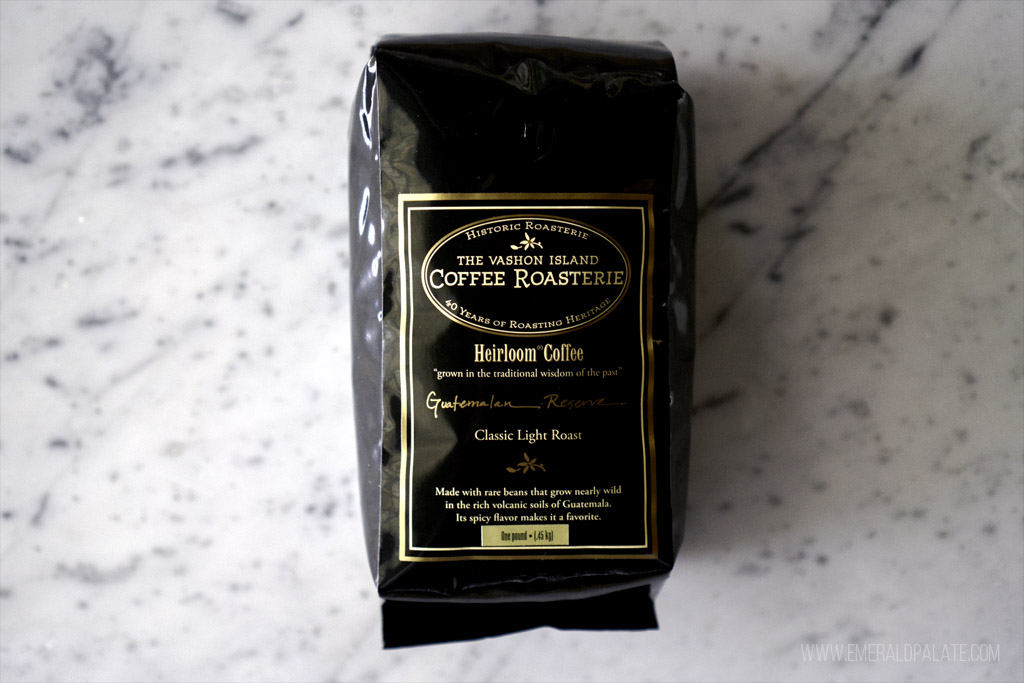
This little coffee roastery is just outside of Seattle on Vashon Island, but the first time I had their coffee was by picking up a bag at a Seattle grocer. It was that bag that got me to start writing down the best coffee beans in Seattle.
That bag was the Guatemalan Reserve (~$15.95). It’s made from a blend of beans grown in volcanic areas of Guatemala. If you look closely, this light roast coffee has a tint of red, which is fitting given its origin. In terms of flavor, expect a smooth palate with some spice.
If you visit Vashon Island, make sure to visit their roastery to fuel up before trying all the Vashon Island restaurants.
Caffe Vita
website | multiple locations in Seattle, Portland, New York City, and Los Angeles | monthly subscription available
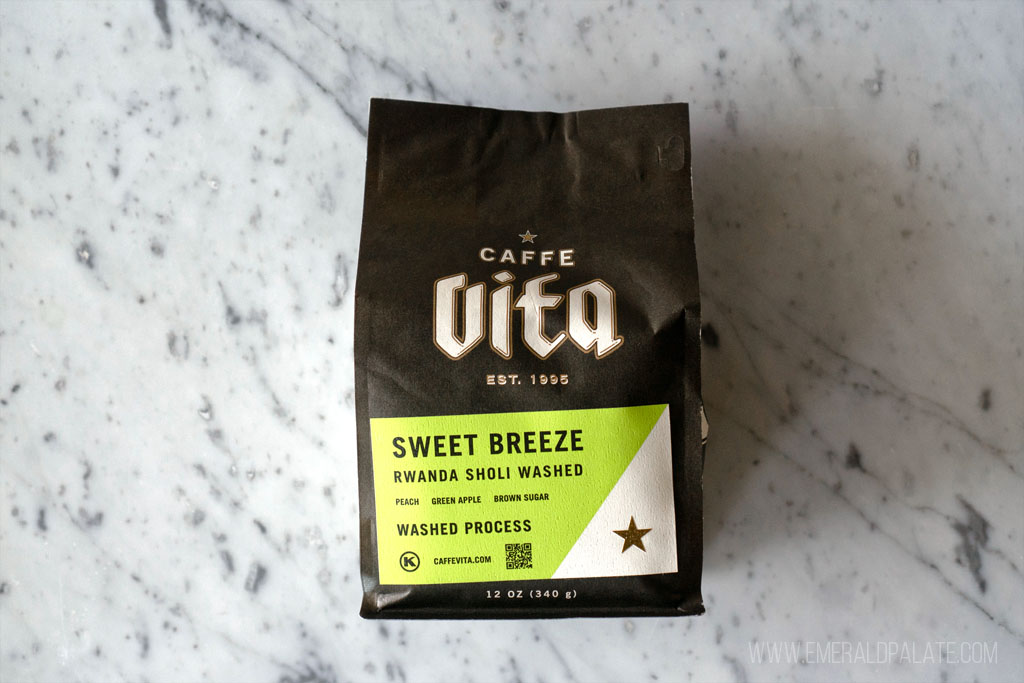
Caffe Vita started in lower Queen Anne back in 1995. It’s still independently owned but has since expanded to be in most grocery stores and has multiple shops across the US. This is one of the biggest Seattle coffee roasters on this list, but that’s because it makes some damn good coffee beans. Despite its size, Caffe Vita works directly with farmers to ensure fair wages and quality.
My favorite coffee from Caffe Vita used to be the Theo Blend (~$19) that’s roasted in partnership with the famous company that used to make some of the best chocolate in Seattle before moving to another state. However, I now find it a bit too dark, so I prefer the single origin light roasts that they switch out monthly.
Two favorites I’ve had recently are the Sweet Breeze Rwanda Sholi Washed (~$24) and El Salvador Las Isabellas (~$24). The Rwanda is really good, even without milk. It has a light, fruity flavor of apple and strawberry that’s been sprinkled with brown sugar. I love the tea-like viscosity that’s perfect for a zippy morning cup.
The El Salvador is a light roast with notes of rose petals, green apples, and brown sugar. It’s both earthy and tart, providing a balanced cup that changes slightly in flavor as you swallow
Pilgrim Coffee Roasters
website | 10002 Aurora Ave N (Greenwood) | monthly subscriptions available
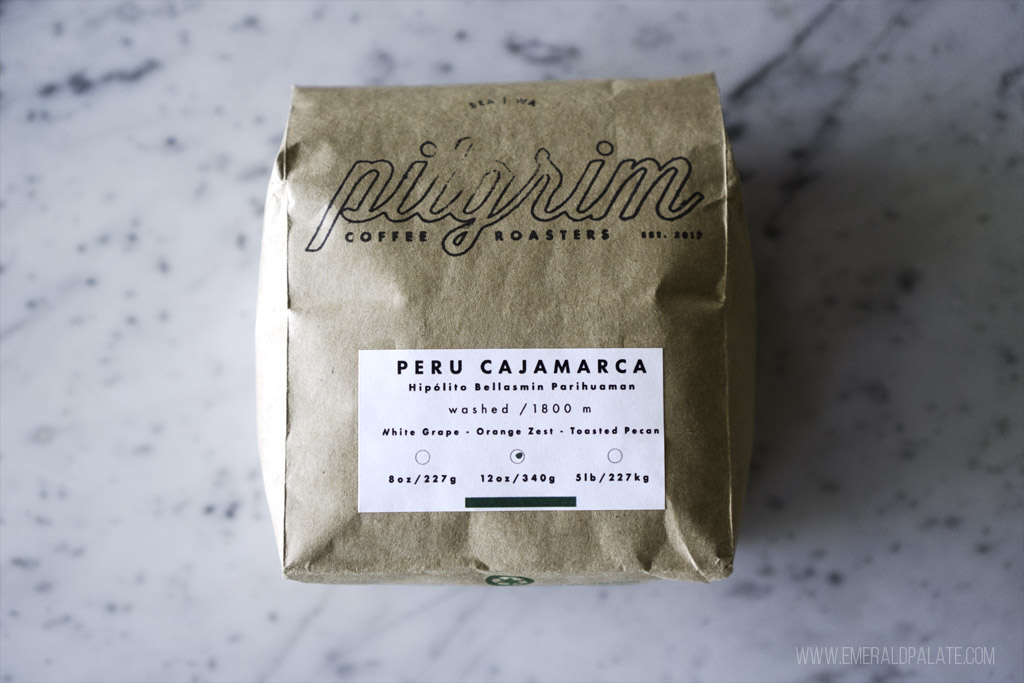
Who would have thought one of my new favorite coffee beans in Seattle would come out of a food truck in north Seattle? It was started by a bunch of friends who thought the community needed a local hangout spot. So they raised crowd-funded capital and opened up their vintage truck first, and now a permanent location.
Pilgrim’s PERU Cajamarca beans (~$20) are phenomenal. They are smooth and creamy with an interesting fruity finish. It runs right in the middle of the spectrum of being smooth for all palates, but then has a bit of complexity that makes serious coffee snobs go, “What was that?”
True North Coffee Roasters
website | retail, online, and wholesale only
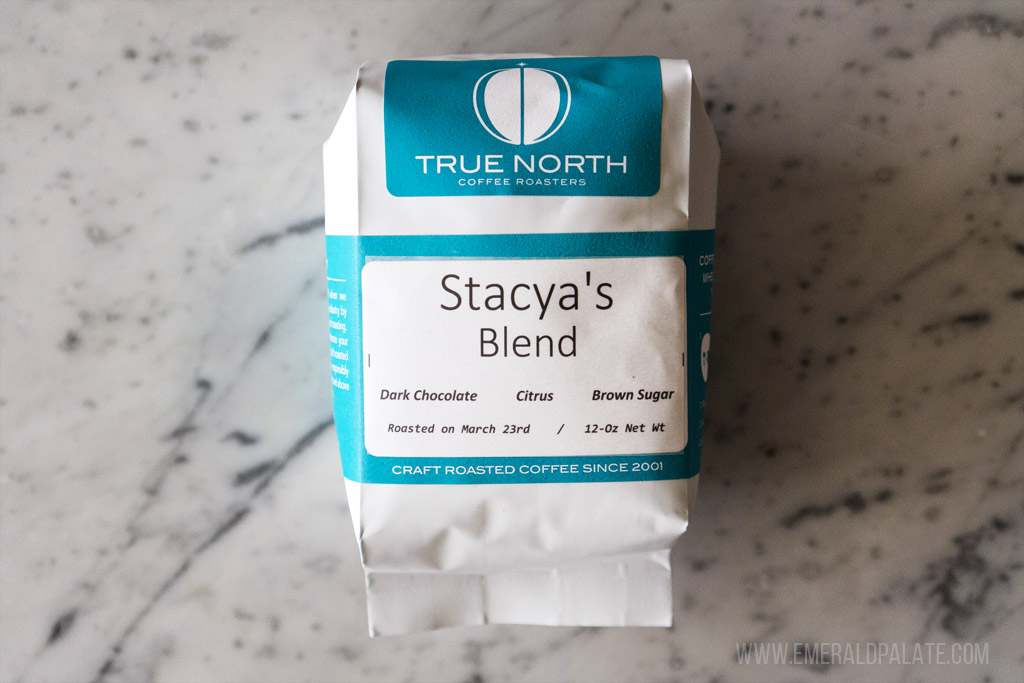
True North Coffee Roasters was founded by two ex-software professionals who are passionate about quality coffee. Their roastery is located in Ballard near some of the best Seattle breweries, but they don’t have a cafe. Instead, they keep costs down by shipping directly to consumers or working with retailers to sell their best coffee beans in Seattle.
My favorite bag is the Stacya’s Blend (~$18, though I’ve seen it as low as $10 in grocery stores). It’s a medium roast blend with beans from Guatemala and Indonesia that has a chocolatey start and citrusy finish.
Elm Coffee Roasters
website | 240 2nd Ave S (Pioneer Square) | monthly subscriptions available
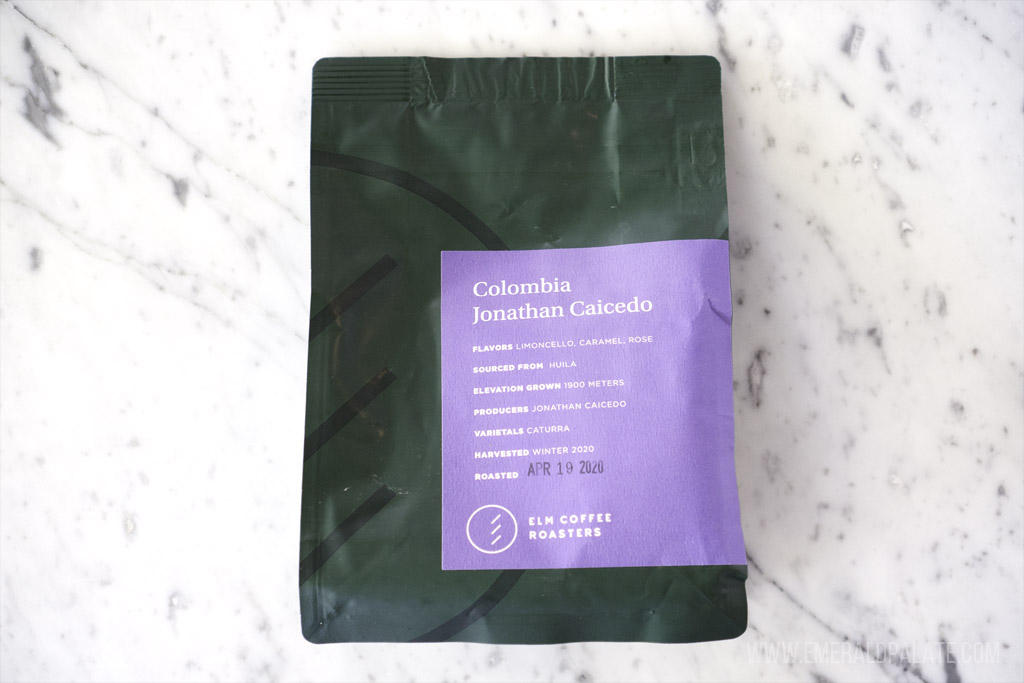
This is another popular Seattle coffee shop where you could easily spend hours using their wifi and sipping coffee. Elm Coffee Roasters was started by a Seattle native who went to New York but came home to start a coffee company. While their beans can skew a bit more expensive, the team’s focus on sourcing quality beans directly from farmers is evident.
While I find a lot of the beans from Elm interesting, I can’t stop thinking about the single-origin coffee, Colombia Jonathan Caicedo (~$28). It’s a light roast coffee grown by a 19-year-old farmer who is doing interesting things with the coffee cherry, the part of the coffee plant that is usually discarded but has the potential to be the next big superfood. The result is a smooth coffee that has some floral notes at the end.
Blossom Coffee Roasters
website | online & wholesale only | monthly subscription available
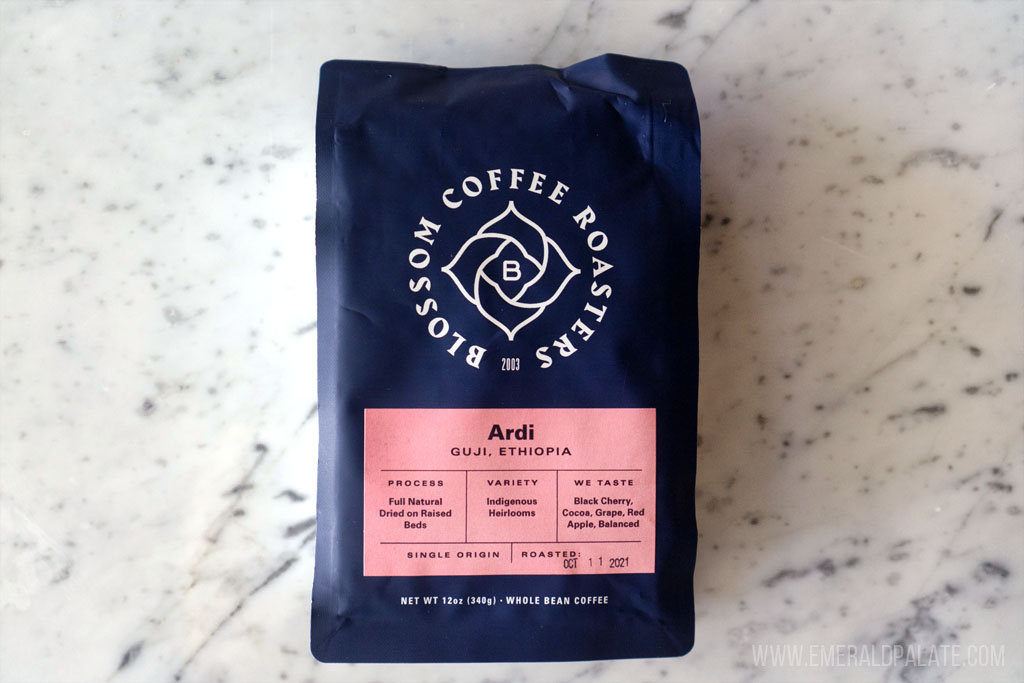
Blossom Coffee is another roaster located on Vashon Island, one of the best islands near Seattle. Owners Dawn and Pat Loraas taste hundreds of coffees a year on their quest to find micro lots growing quality beans. They do weekly cuppings to continuously train their palate and refine the coffee they sell consumers.
If it’s available, the Ardi from Ethiopia (~$21) tastes like marzipan and is fruit-forward. You can really taste the apples and grapes Dawn and Pat mention in the tasting notes. Yet this fruit bomb is still smooth and creamy, not acidic.
BlackFin Coffee
website | online only | monthly subscription available
BlackFin is a mission-driven specialty coffee company based in Seattle. They partner with local nonprofits to donate proceeds from coffee purchases toward saving the resident orca whales in the Pacific Northwest, which people love to seek out on whale watching excursions near Seattle. BlackFin also pays all of its employees the same amount, including the owner.
If it’s available, try the BlackFin Tanzanian light roast (~$18). It has a super long finish, longer than most coffees I’ve had. It’s hazelnut-y and roast-y with notes of marshmallow.
Cloud City Coffee
website | 8801 Roosevelt Way NE (Maple Leaf) | monthly subscription available
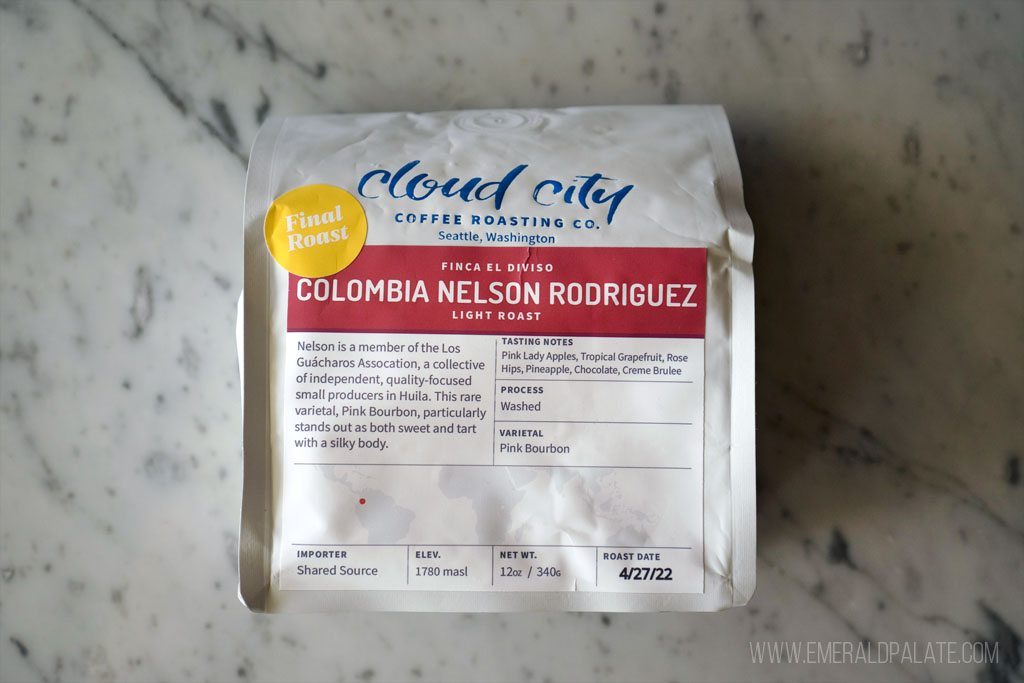
Cloud City is a button of a neighborhood coffee shop beloved by locals. At any given time you’ll see regulars popping in and out to grab coffee or pastries to go. It’s a good vibe, which makes the fact that their coffee is good all the better.
If available, get the Colombia Nelson Rodriguez single origin light roast (~$20). It’s smooth and opens up as it washes over the back of your palate to reveal creme brûlée notes, followed by grapefruit and apples.
Armistice Coffee
website | multiple locations in Roosevelt, Downtown, and Eastlake
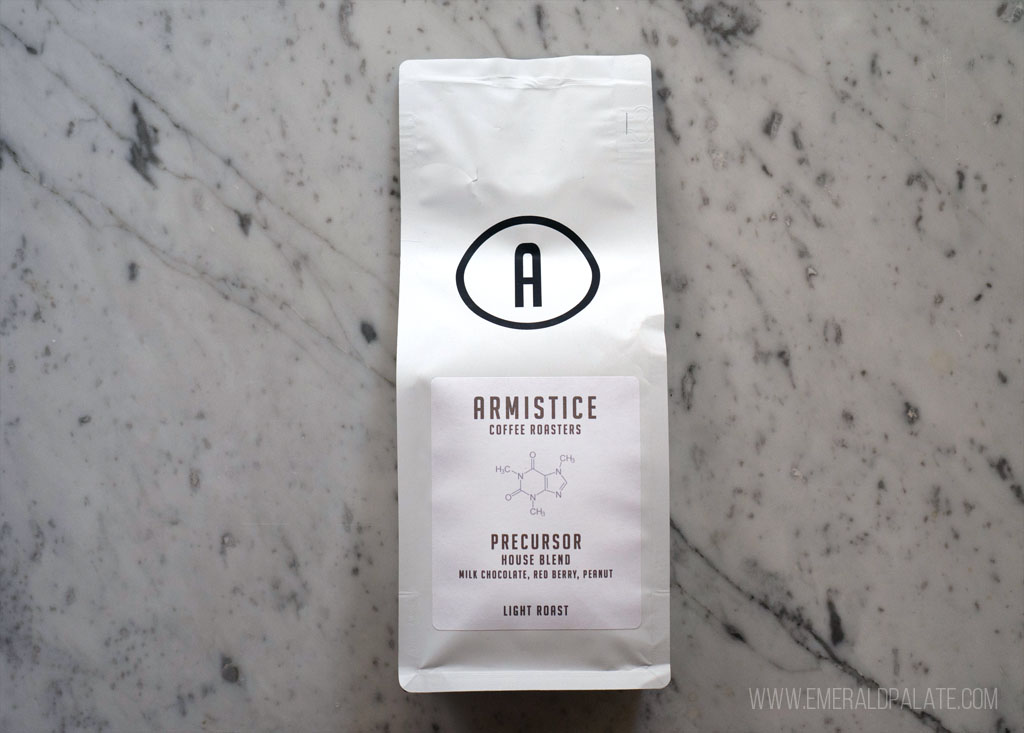
Armistice is one of the few female-owned Seattle roasteries. Rebecca used to work in the industry but wanted to create a space that was safe for employees and customers. She’s grown it to have multiple locations, all of which still have a neighborhood feel.
If available, get the Precursor Blend (~$16). It has sweet cocoa flavors and a rich viscosity that’s sure to please even the pickiest of coffee drinkers.
Dorothea Coffee
website | online & retail only | monthly subscription available
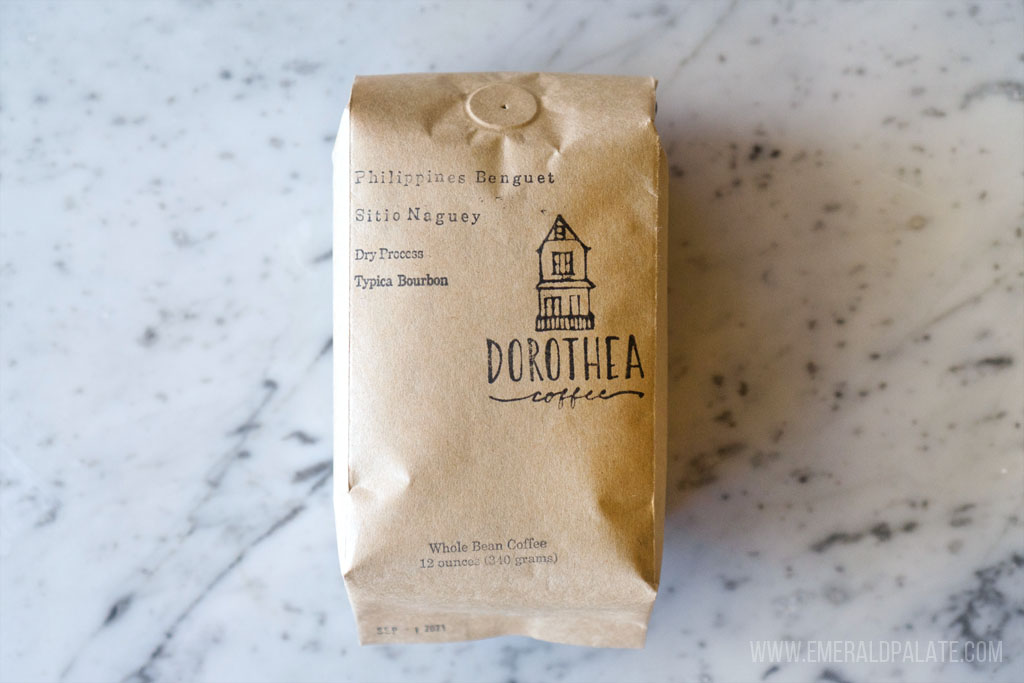
Dorothea is a micro roastery in Seattle owned by two friends, Conor and Tanisha. They actually merged with a coffee company called Logbook Coffee, which used to be a separate micro roastery which Conor also roasted coffee for. They’re going to change their packaging and maybe their coffee, but hopefully some of my favorite stick around for you to try!
If available, get the Fruit Bomb: Ethiopia Yirgacheffe (~$17), which used to be a Logbook Coffee. It has a full, luscious mouth feel. The tasting notes say you’ll find tropical mango flavors, but I thought it was more earthy with only a hint of fruit at the end. Either way, it was friggin’ delicious!
From the Dorothea brand, get the Kamgogo Kenyan coffee (~$24). It’s sweet and smooth with flavors of lychee, honey, and papaya.
Stamp Act Coffee
website | online only | monthly subscription available
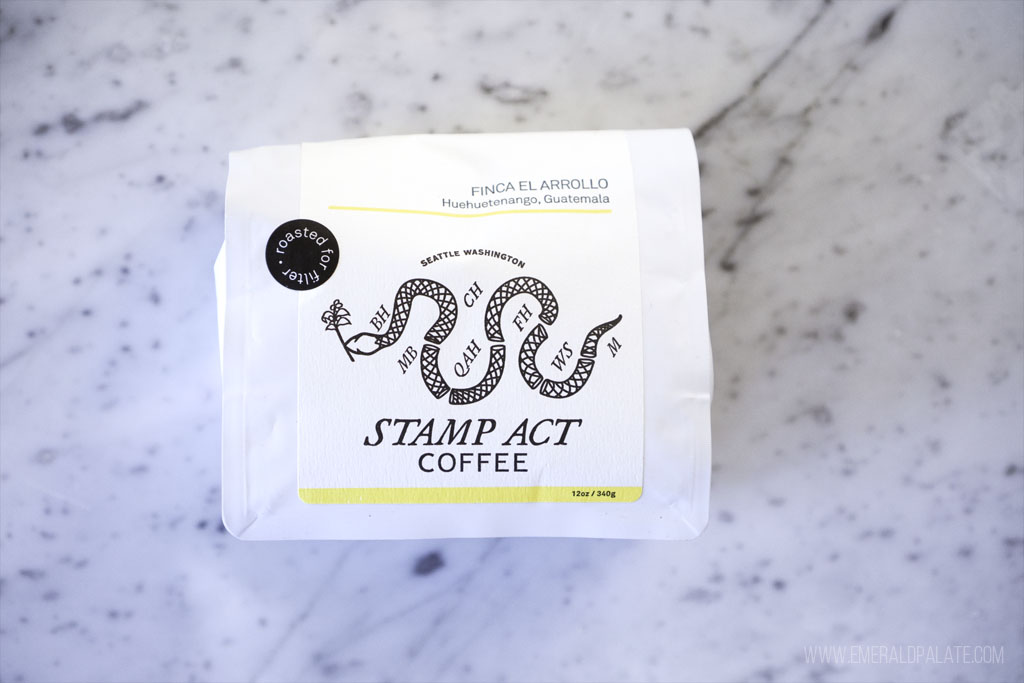
Stamp Act is a super small micro roaster in Seattle without a cafe. Owner Andrew has a long track record of working in the coffee industry. He started as a barista in Seattle before working alongside coffee growers in Ethiopia. From there, he started a roasting company in Singapore before jumping ship to Australia to help a local coffee roaster there. Now he’s back in Seattle making excellent small batch coffee.
If you’re a history buff, you’ll recognize the name. The Stamp Act caused us to kick tea in the harbor and start a revolution while embracing coffee as our drink of choice.
The Finca El Arrollo beans (~$22) from Guatemala is incredibly smooth. The flavor profile changes from some acid and fig at the start to cocoa at the end. I found it complex and interesting, a cup that will make you tilt your head like a dog wondering what those flavors are.
Conduit Company
website | online and retail only | monthly subscription available
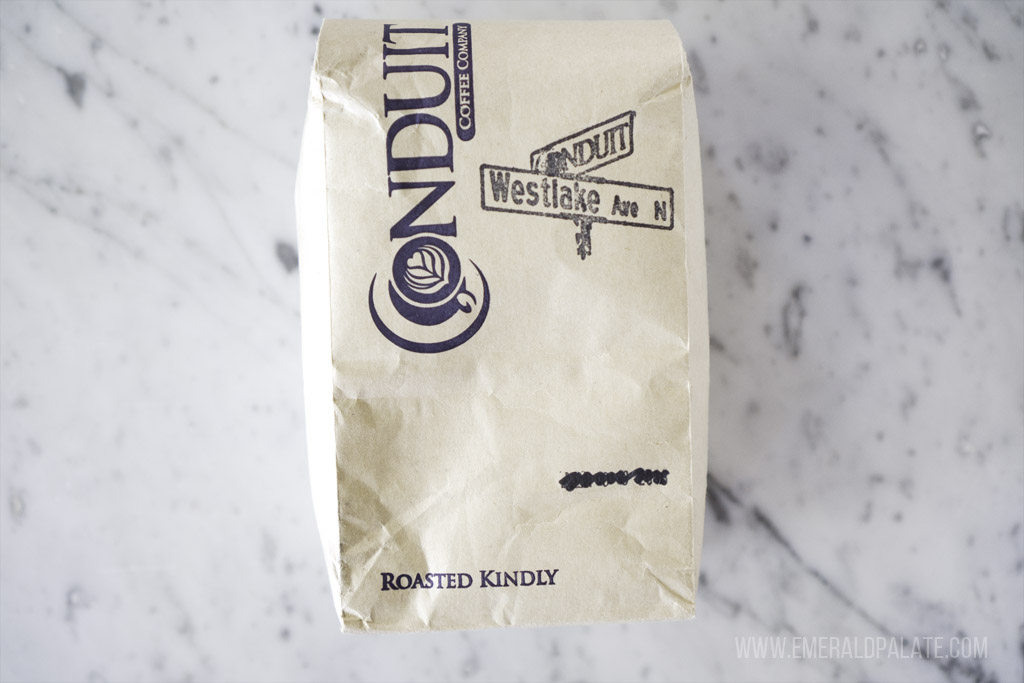
This little coffee shop’s bike-lovin’ owners are producing some seriously good coffee in Fremont, one of my favorite neighborhoods for a Seattle food tour. They deliver coffee by bike around Seattle and used to have a tiny bike-up coffee shop in the parking lot of the Nickerson Saloon (but it closed in 2021).
My favorite beans to take home are the Westlake Avenue (~$15). This medium-light roast has a subtle aftertaste of marzipan when you add milk. If you make it by the pour-over method, it’ll result in a satisfying tea-like viscosity.
Pollard Per Se
website | online & retail only | monthly subscription available
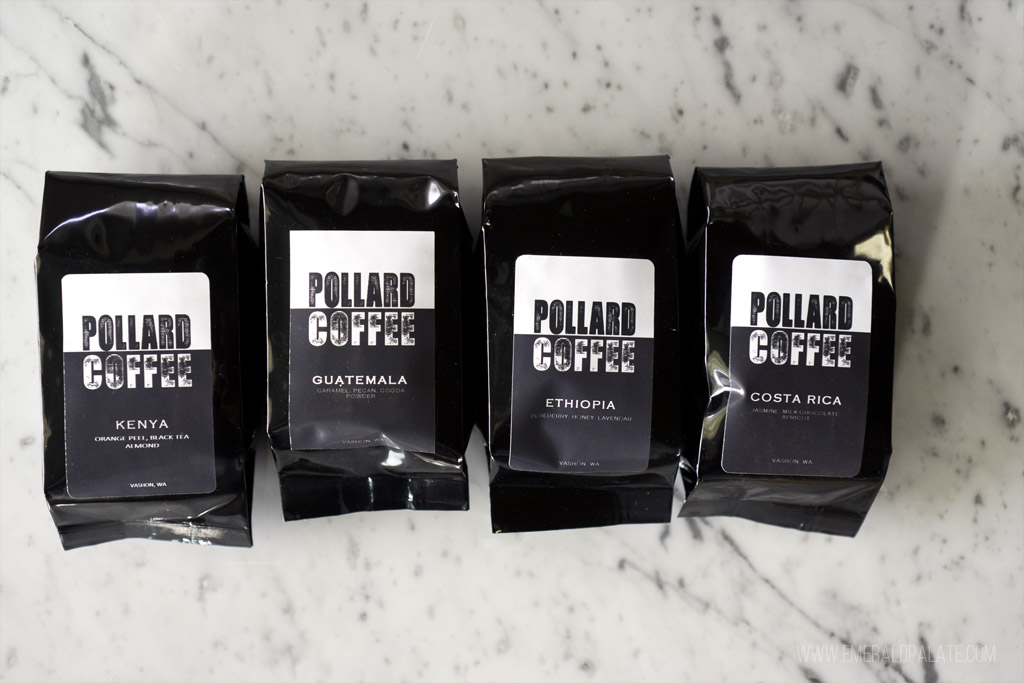
Robin Pollard grew up in a farming family in Iowa and later went on to earn a Master’s of Science in Agriculture. All of this is to say she knows how to make beverages that honor the terroir of where it’s from. In fact, she also grows grapes for her wine label, which is heralded for being some of the best wines from Washington State.
If available, try her Kenya ($20) or Guatemala ($20) single-origin coffee beans. The Kenyan one is smooth with notes of almond and citrus. You know that dryness you get after drinking black tea? This coffee has a bit of that. The Guatemalan is also smooth but with more caramel and pecan flavors.
Herkimer
website | 7320 Greenwood Ave N (Phinney Ridge), 5611 University Way NE (Ravenna) & 2101 4th Ave (Downtown) | monthly subscriptions available
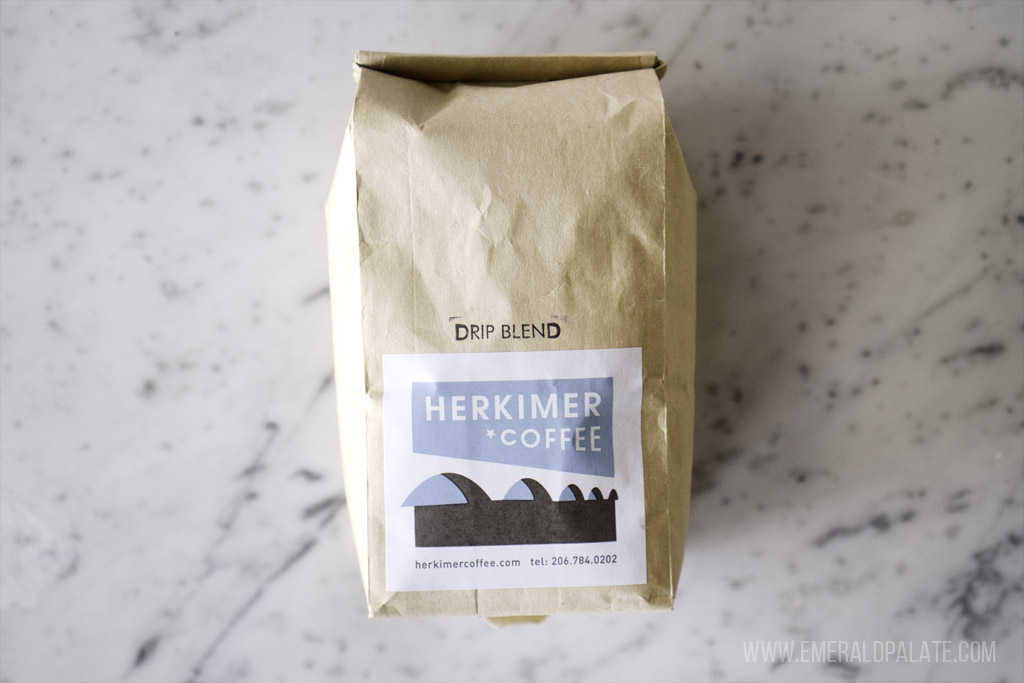
Herkimer was one of the first coffee roasters I fell in love with in Seattle. When I moved here, I idolized my sister and brother-in-law (shh don’t tell them). They turned me onto this place and it’s held a special place in my heart ever since.
All of the beans I’ve bought from Herkimer are good, but I often grab the affordable bag of Drip (~$15). It’s smokier and has less fruit or acid notes than others, but it is a solid cup of coffee (especially with milk!).
Victrola Coffee Roasters
website | multiple locations in Capitol Hill, Downtown, and Beacon Hill | monthly subscriptions available
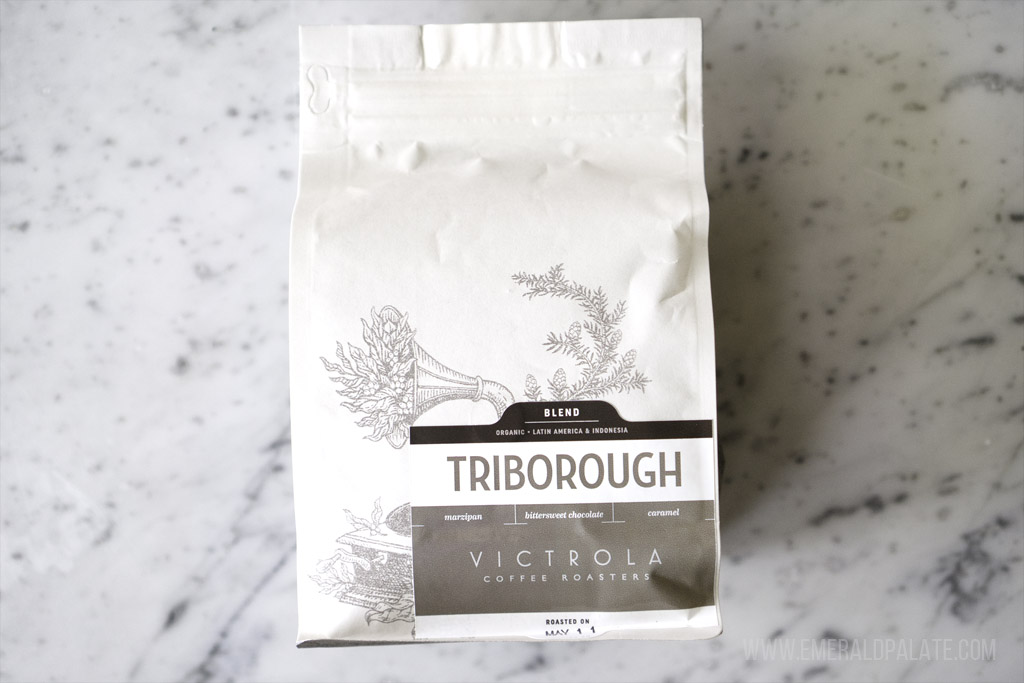
Victrola is another OG roaster of some of the best Seattle coffee beans. Its staff is also a dream: I worked with them to host a cupping and latte art event to learn how to taste coffee.
It was fascinating, but also a first-hand sighting of just how seriously their roasters take coffee. Hearing them talk about tasting hundreds of cups, like, a week and trying to mimic their difficult technique for properly tasting coffee was humbling. You can also visit their roasting location in Capitol Hill to get a glimpse at how they roast beans.
If you like lighter roasts, try Victrola’s Peru El Milagro Espresso (~$18). It’s quite a light roast, but it covers the palate with notes of toasted chestnut and milk chocolate.
Broadcast Coffee Roasters
website | multiple locations in Central District and Roosevelt | monthly subscriptions available
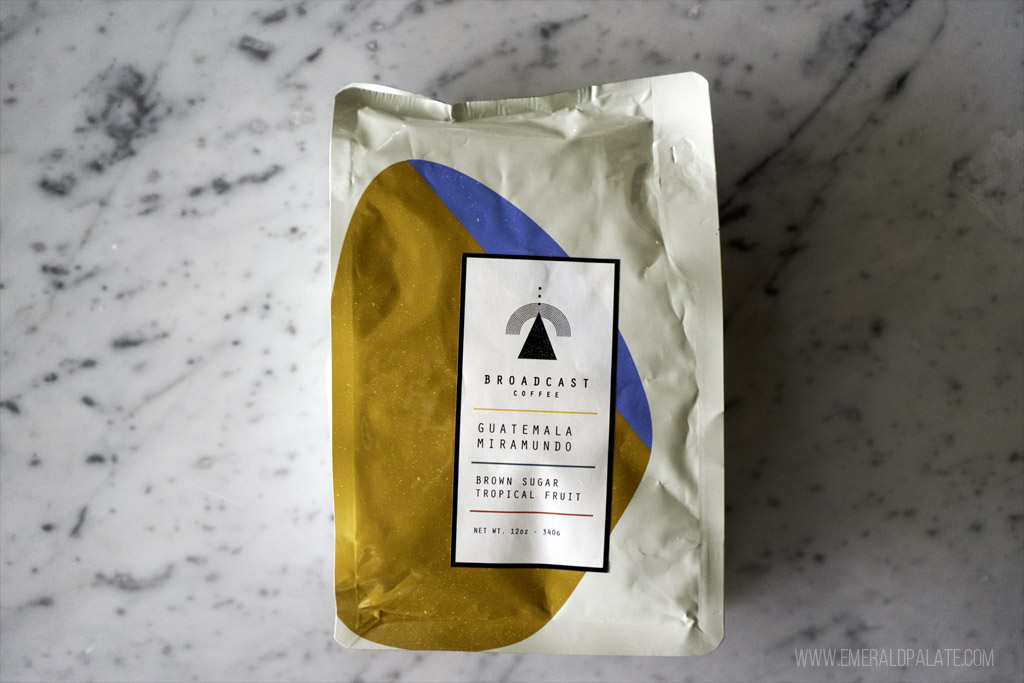
Broadcast Coffee wins for the most beautiful package design. The name is a nod to the owner’s family history running radio stations in Idaho. The first bag of coffee I ordered from them was the Breaker 9, which was a bit too dark roasted for me.
However, when I tried their Guatemala Miramundo beans (~$20)…wow oh wow. It’s smooth and creamy with a marzipan and fruity finish. It’s a medium roast that has some heft that stands up against a splash of milk.
Café Hagen
website | multiple locations Downtown, Queen Anne, and SLU | monthly subscription available
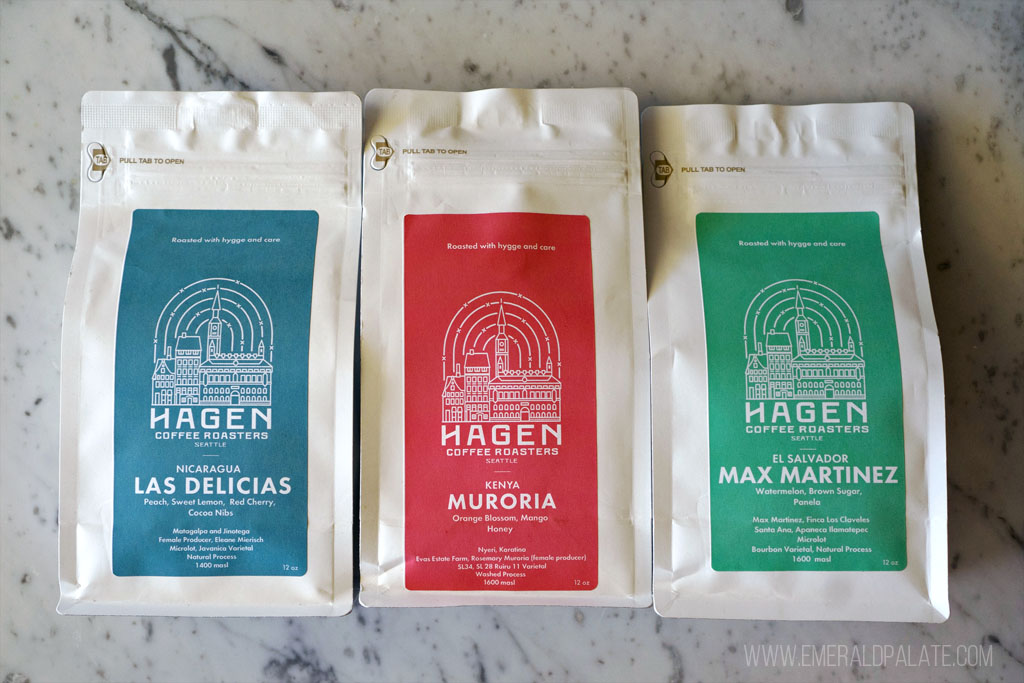
Owner Maria Beck came to Seattle from Scandinavia with a passion for sharing hygge, the cozy contentment and well-being you feel from enjoying the simple things in life. You’ll find beautiful cafes with baked good recipes passed down in Beck’s family. They go perfectly with their exquisite coffee.
If available, get the Nicaragua single origin (~$24). It’s fruity and robust, which holds up against a cardamom bun. Note, it can take a while to get delivery so don’t wait until you’re out of beans to order!
Tanuki Coffee Roasters
website | online & retail only
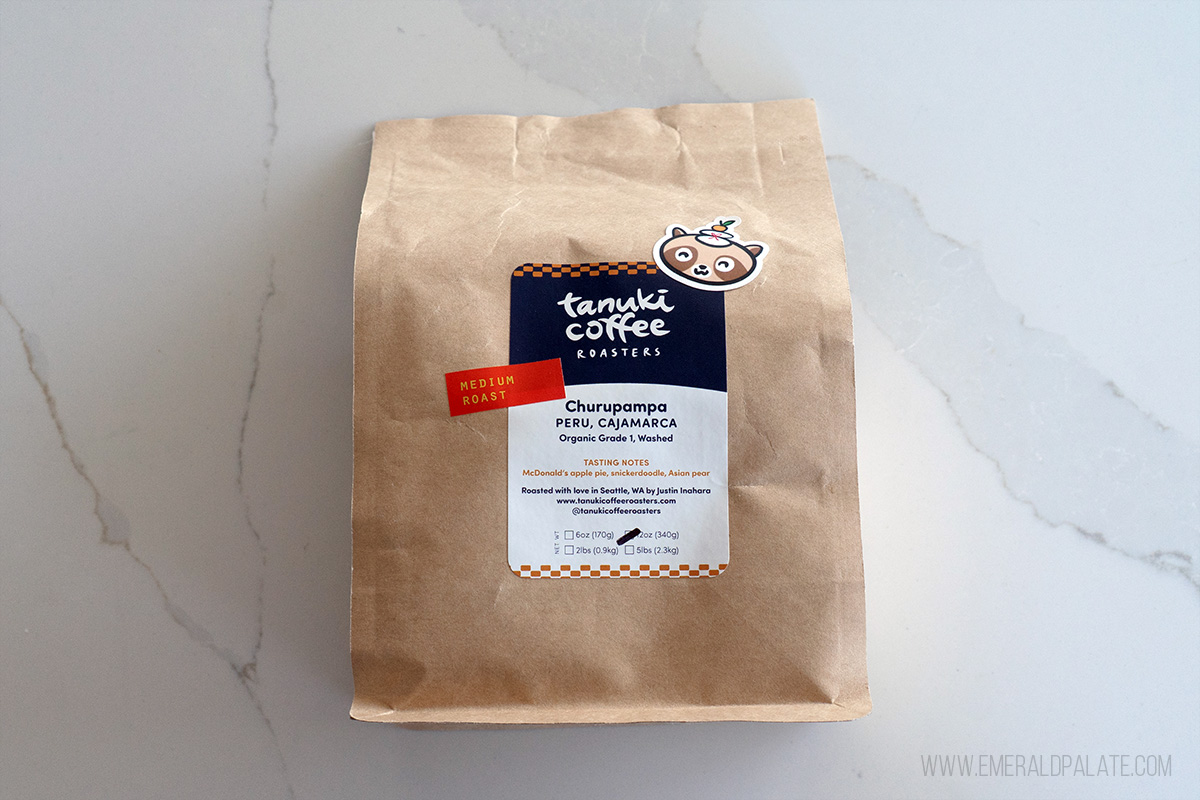
Tanuki is a super under-the-radar micro-roaster that I learned about when shopping at Mixed Pantry, one of the best gift shops in Seattle for Asian-owned foodie goods. It’s owned by Japanese-American, Justin Inahara, who moved from Oregon to Seattle and started roasting at Broadcoast Coffee. After learning the trade, he started roasting his own coffee and soon developed Tanuki.
If available, get a bag of the Peru Finca Churupampa beans (~$19.50). It’s a medium roast that Justin describes as tasting like McDonald’s apple pie and streusel. I’m so sure about the pie, but I definitely get a hint of streusel that registers as almonds to my less-sophisticated coffee cupping palate. I love how even through the nuttiness, you get a pronounced sweetness that lingers to make this cup feel playful and interesting.
Caffe Ladro
website | multiple locations in Fremont, Downtown, Queen Anne, & Ravenna | monthly subscription available
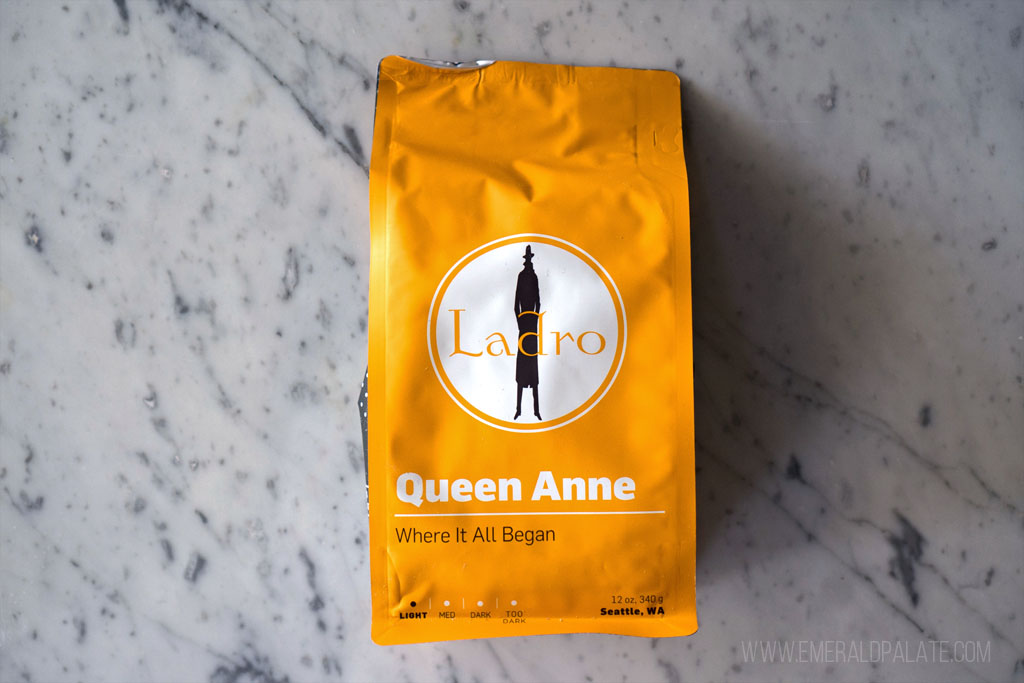
Caffe Ladro is another one of the larger roasters serving the best coffee beans in Seattle. They have 18 locations nationwide, yet each one still feels like a cozy neighborhood joint.
If available, get a bag of the Queen Anne blend (~$17). It’s chocolatey and almond-y with a way more robust flavor than you’d expect from a house blend.
Seven Coffee
website | online & retail only | monthly subscription available
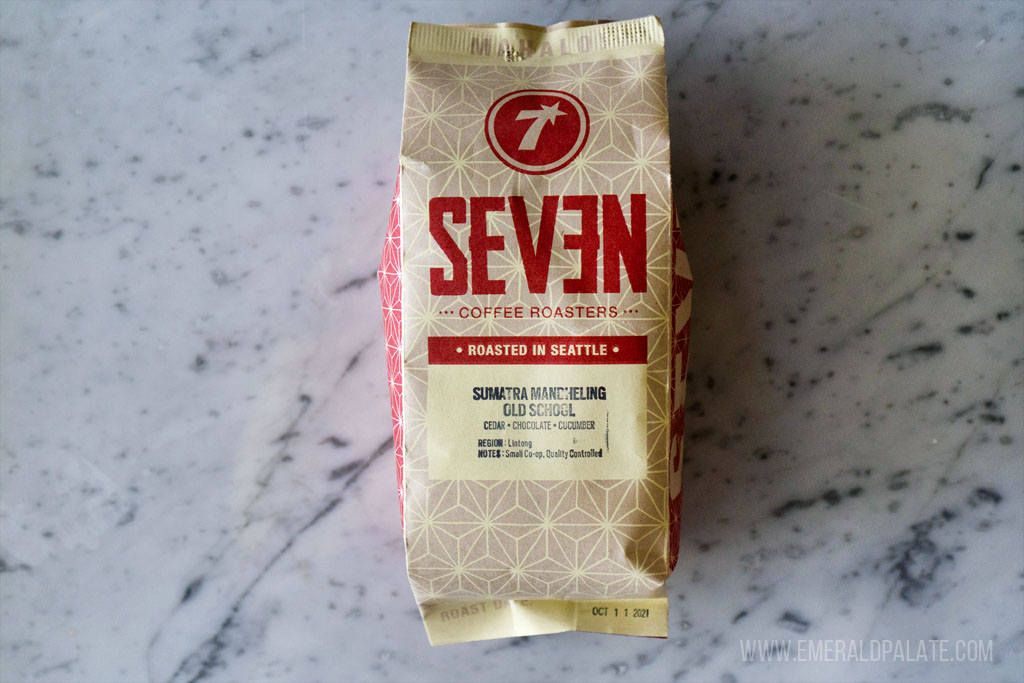
Seven Coffee brings Hawaiian coffee to Seattle. Owner Sean Lee moved from Oahu and makes specialty coffee using Kona beans and others from around the world. You’ll find their coffee in restaurants like Biscuit Bitch, who even has a co-branded blend made just for them.
If available, try the Seven Sumatra (~$17). It has a supple mouth feel and leaves fruit lingering on the palate long after you swallow.
Ugly Mug Coffee Roasters
website | 1607 W Dravus St (Interbay) & 1309 NE 43rd St (U-District)
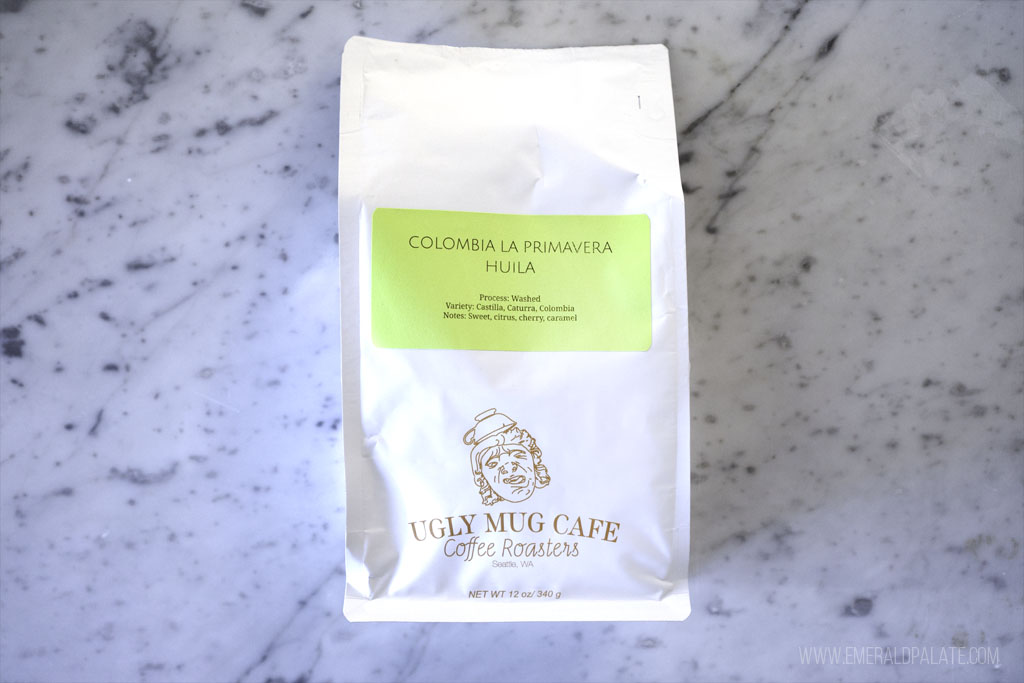
This micro roaster had been on my list for a while, but they took a break from roasting when I first heard about them. I recently tried their Colombia La Primavera Huila coffee ($17) and immediately understood why they say on their website they focus on balance.
It’s smooth and creamy with a touch of acidity at the end. It isn’t as pronounced as other coffees I’ve had, which is perfect for those times you just want a no-fuss cup of coffee you can rely on.
Cafe Avole
website | 2330 E Union St (Central District) | monthly subscription available
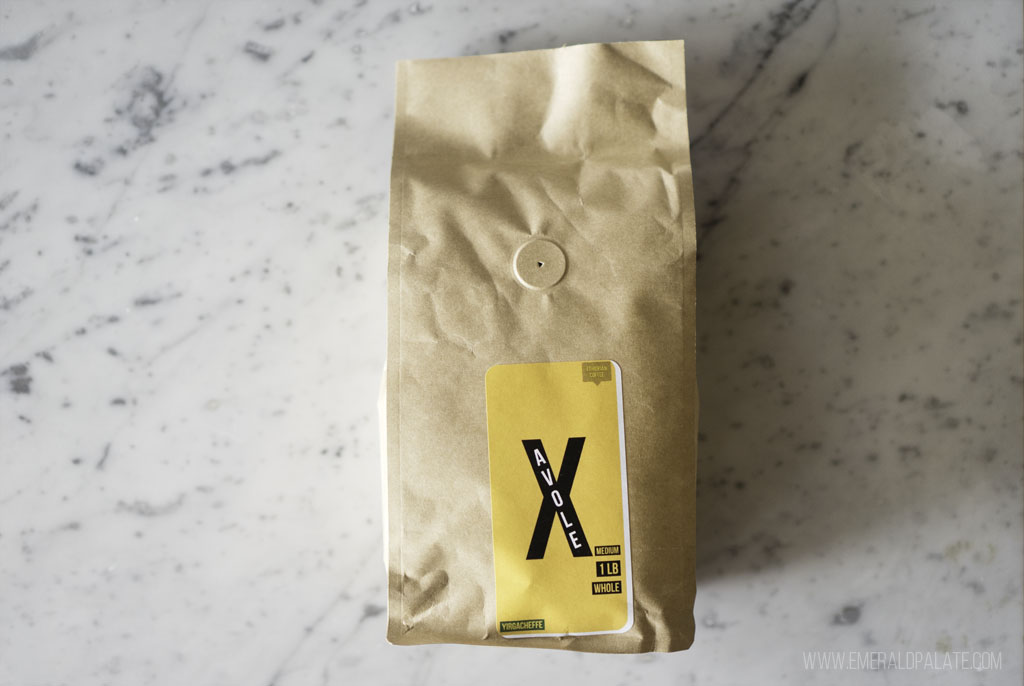
This Black-owned Rainier Beach coffee shop pronounced “ah-bohl” serves Ethiopian coffee. It was opened by young entrepreneur, Solomon, right out of college, who crowdsourced funds when he couldn’t get a loan. Now his cafe is a gathering spot for food and Jabena, coffee brewed using the traditional African method.
Get the Ibex Roast (~$20) beans if available. They’re a medium roast with ever-so-slight dark notes.
Lighthouse Roasters
website | 400 N 34 St (Fremont)
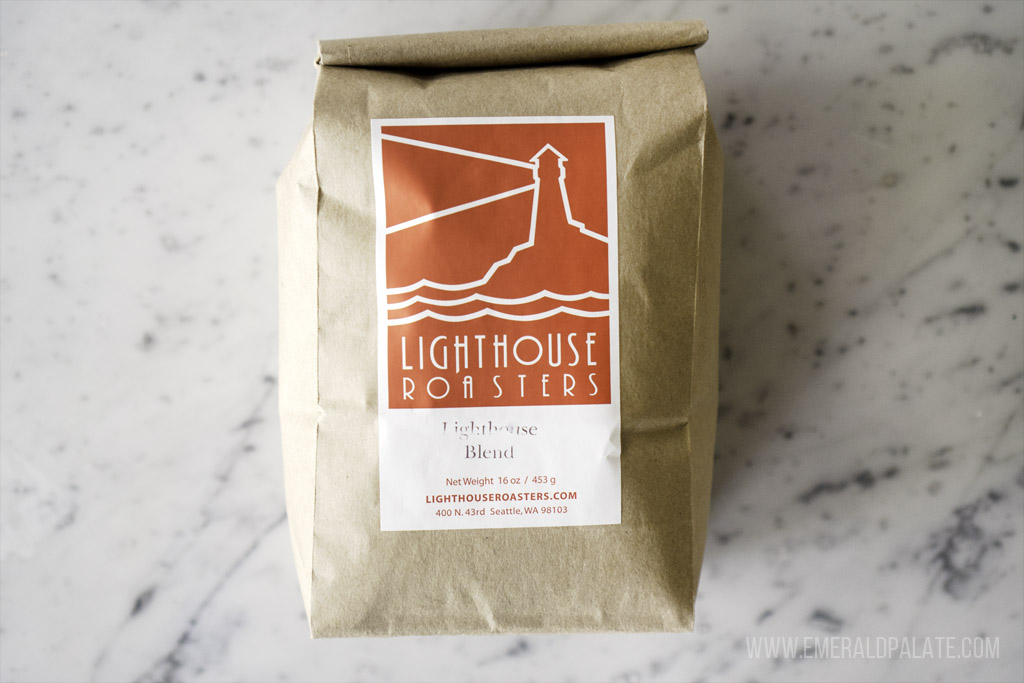
This button of a coffee shop feels like one of the last hidden spots in Seattle. It’s in the middle of an artsy neighborhood off busy streets and is easy to miss. It uses a vintage cast-iron roaster to roast small batches of beans every day.
My favorite bag to buy is the Lighthouse Blend (~$20). It’s a medium roast that uses beans from Latin America to create a chocolatey-smooth cup.
Espresso Vivace
website | 532 Broadway E (Capitol Hill) & 227 Yale Ave N (South Lake Union) | monthly subscription available
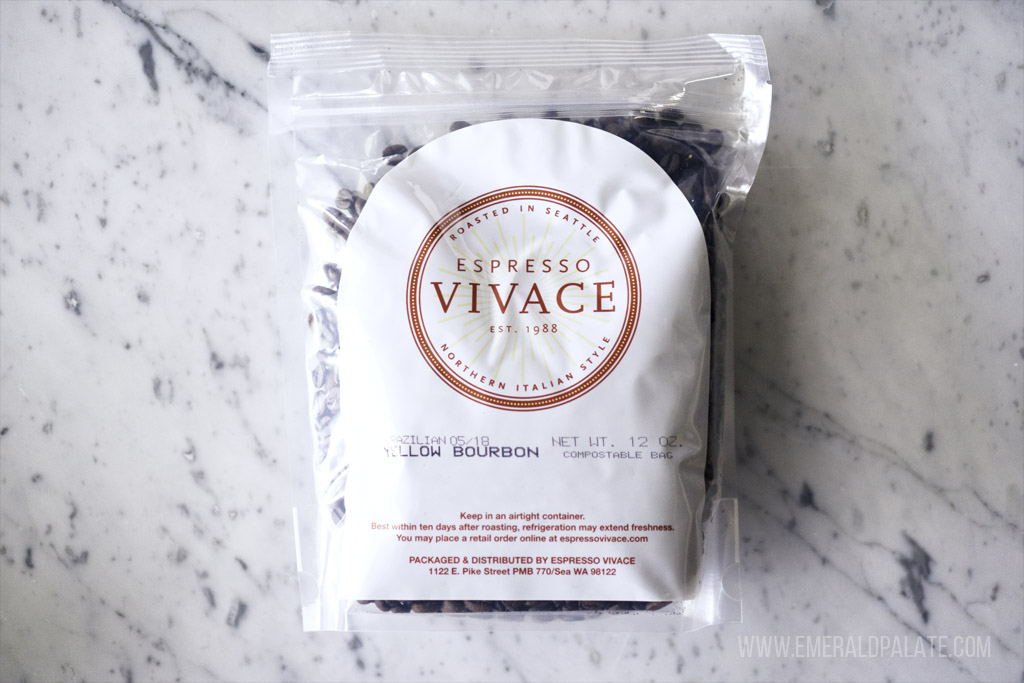
If you love espresso, this small-batch Seattle coffee roaster is for you. Espresso Vivace was started in the early 1990s after its now-owner traveled to Italy. They focus on northern Italian-style coffee, which roasts and blends mild Arabica beans with the goal of coaxing out as much of their caramelized sugar content as possible.
My favorite of Espresso Vivace’s coffee beans to take home is the Brazilian (~$22). It tastes like espresso with that roasted flavor, but finishes smoother than others. You won’t taste that sooty “dark roasted” flavor characteristic of most traditional Italian-style espressos, which in my book, is preferable.
Tips for buying and brewing Seattle coffee beans
When you buy coffee beans from Seattle, I highly encourage you to keep these things in mind:
Know your beans
There are two types of beans in the world: Arabic and Robusta. Robusta beans tend to be cheaper because they are pollinated by animals and nature, whereas Arabica beans self-pollinate.
Because they’re more affordable, Robusta beans are typically used to mass produce coffee. While some small batch coffee roasters are able to elevate robusta beans, particularly Vietnamese roasters, in general you want to buy coffee from Seattle roasters that use Arabica beans.
Buy fresh beans and store them well
Before buying beans, always look at the roasting date and be wary of bags that don’t have any. When you buy online, you’re typically getting beans delivered that were recently roasted. Try to use your beans within a week of buying them for the freshest flavors, and always store them in a cool, dark place, like a cabinet (not a freezer).
buy whole beans
Using fresh, whole beans that are freshly ground at home will provide the optimal flavor. I have a cheap Krups electric grinder (labeled coffee, so I don’t accidentally grind spices in it!).
Opt for single-origin or blends
Blends tend to be more affordable than single-origin beans, but single-origin gives a truer essence of the region and can’t hide imperfections like a blend can. As for the type of roast, medium and light roasts are best for tasting the nuances of the beans, whereas dark roasts are lighter on the caffeine.
Keep track of what you like
If you fall in love with a coffee, make note of what you like about them so the next time you buy, you can start looking for flavor notes that jive with your palate. For example, I love fruity and acidic coffees best, so I’m a sucker for bags that say things like “green apple” on them.
Try it black first
Please don’t use sugar regardless of your brewing method. Hell, most purists say don’t even use milk or cream. I pour milk, never cream, into my mug before pouring in coffee (pro tip, since this naturally “mixes” the milk in without having to dirty a spoon), but when I try a new coffee I always taste it black first.
In terms of brewing, all of the best coffee beans from Seattle will do well using any brewing method. However, I highly encourage you to try brewing your coffee using a French press, AeroPress, or pour over method. These coax out the flavors more than drip coffee machines and give you a really great sense of the beans.
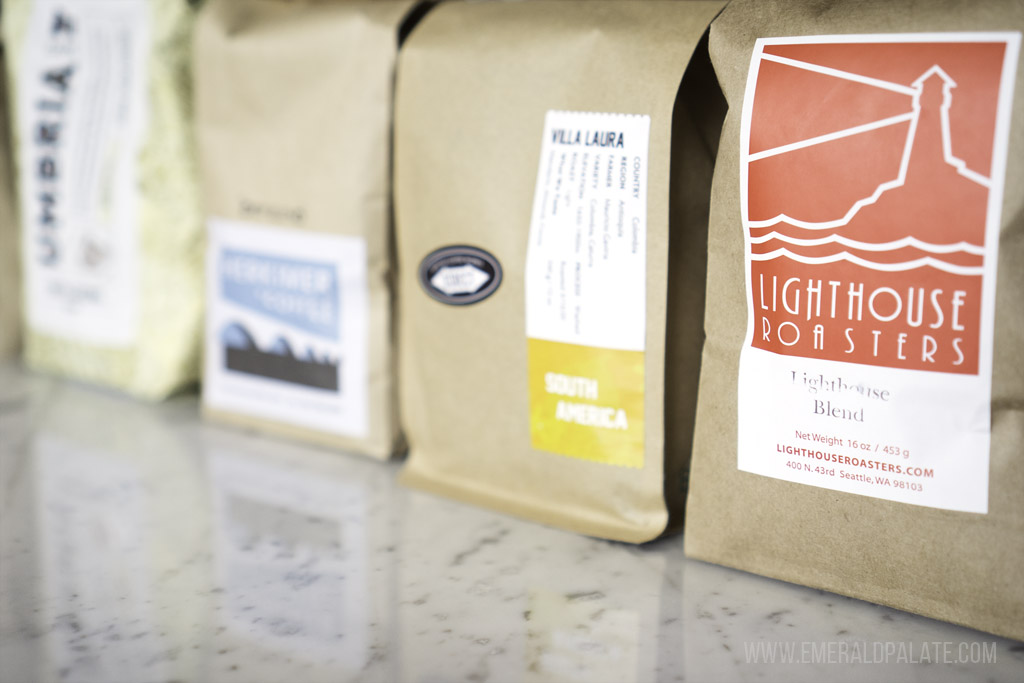
Bring more of Seattle home
If you think Seattle coffee roasters take their craft seriously, you should check out other small batch makers.
- Food Gifts Made in Seattle
- Best Pacific Northwest Foodie Gifts
- Where to Get the Best Seattle Gifts Online
- How to Stock Your Pantry with Pacific Northwest Artisans
- The Best Store-Bought Ice Cream Is from Washington
- The Best Limoncello Is Distilled in Seattle
